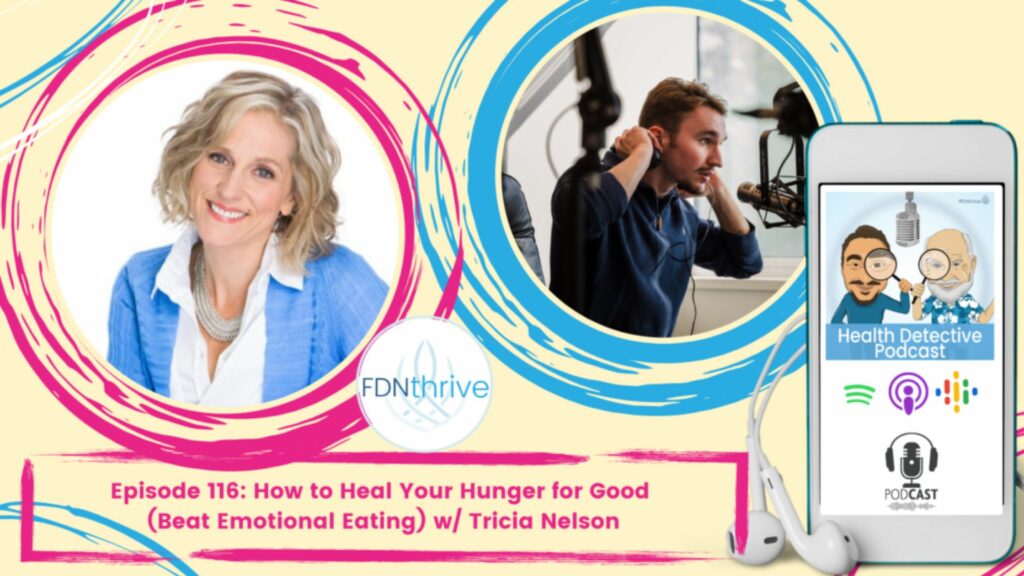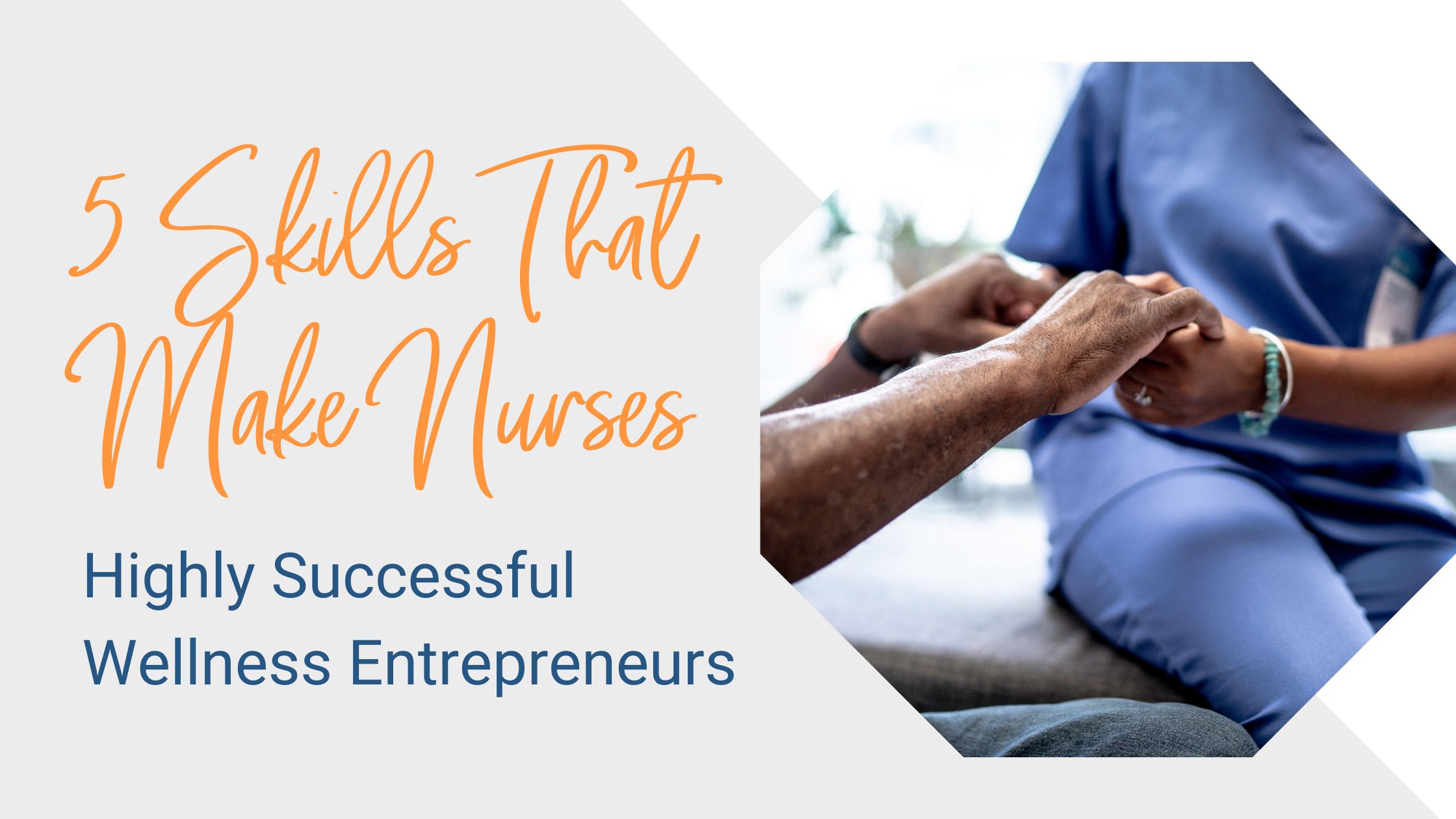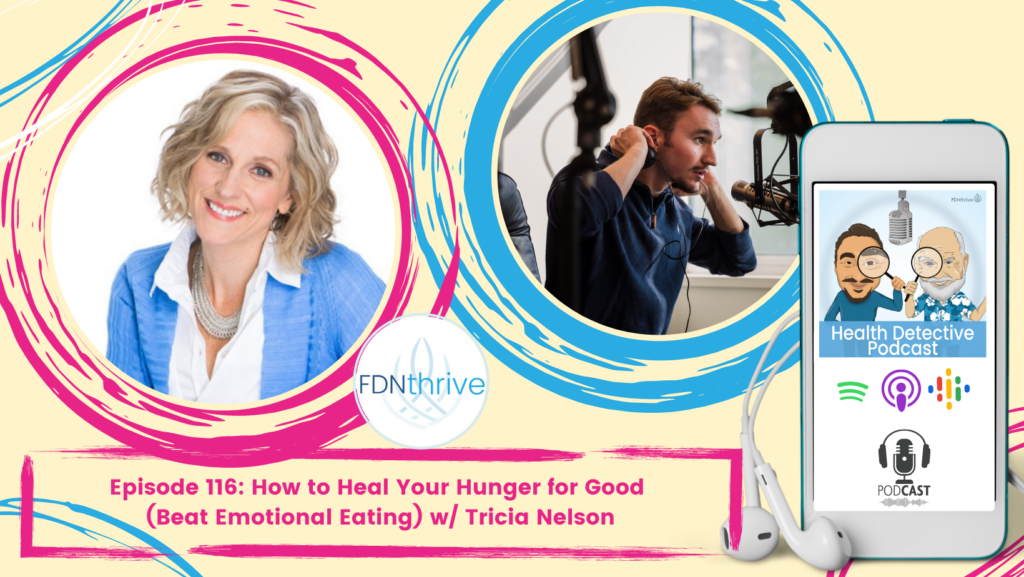
Tricia’s Background in Emotional Eating
[00:00:57] Detective Ev: Hey, what is going on my friends? Welcome back to another episode of the Health Detective Podcast by FDNthrive. My name is Evan Transue, AKA Detective Ev. I will be your host for today’s show. The conversation was awesome, it is about emotional eating. Believe it or not, I’m someone who is kind of realizing more and more that I’m at least somewhat subject to this.

I do want to tell you a little bit about Tricia really quick. She lost 50 pounds by identifying and healing the underlying causes of her emotional eating. Tricia has spent over 30 years researching the hidden causes of the food addiction. Tricia is an emotional eating expert and author of the number one best-selling book Heal Your Hunger: Seven Simple Steps to End Emotional Eating Now. She is also the host of the popular podcast, the Heal Your Hunger Show.
Tricia is a TEDx speaker, a highly regarded coach, and has been featured on the list – NBC, CBS, KTLA, Fox, and Discovery Health. Without further ado, let’s get to the episode.
Introduction
All right, Tricia. Welcome to the Health Detective Podcast. How are you?
[00:03:03] Tricia: Thanks for having me. I’m doing great. Evan.
[00:03:07] Detective Ev: This is an interesting topic for me. I hate that there’s a stereotype with the topic of emotional eating, because there’s a stereotype that it’s something that mostly women deal with. And that’s a male induced stereotype because we’re the ones that don’t want to talk about this. I think that’s silly.
Then you add the additional stereotype, it’s something that most people would deal with if they were emotionally eating, such as yourself. You know, you get that weight gain for a time.
Well, then there’s people like me. Younger male. I could eat whatever I want, and I don’t gain weight, but I do get sick. So, there’s still consequences to be paid. But emotional eating is something I never really would have looked at until the last year. I’m super excited to talk to you about this.
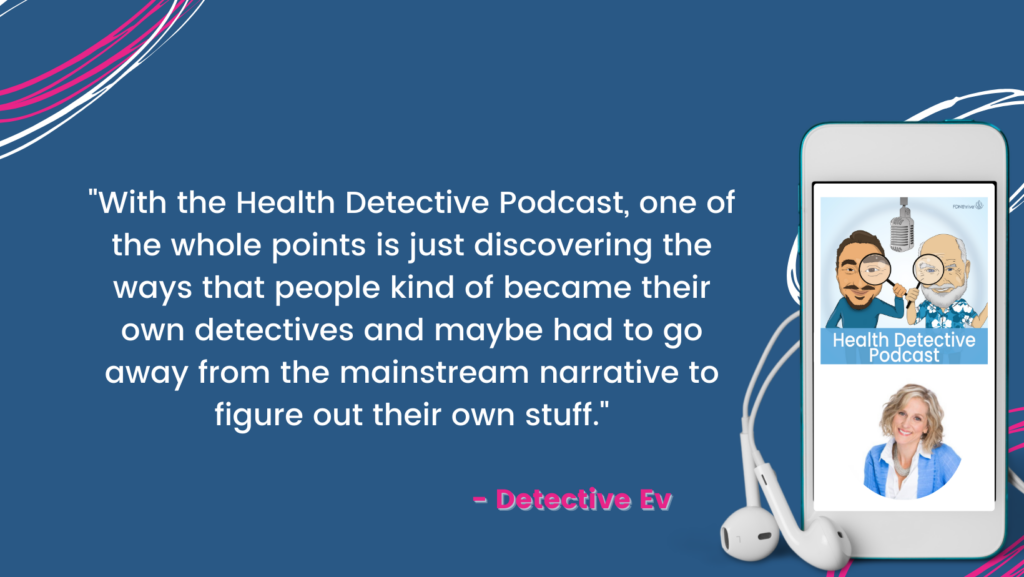
Of course, with the Health Detective Podcast, one of the whole points is just discovering the ways that people kind of became their own detectives and maybe had to go away from the mainstream narrative to figure out their own stuff.
So, my favorite question is always our first one, and that’s just, when did these health symptoms start? I don’t know if there was anything more than the emotional eating, but even if that’s it, that’s fine. When did this begin for you?
“Fat Head” Mentality
[00:04:09] Tricia: Well, in hindsight, I think from way back when, and I mean way back when, because I’m not a spring chicken.
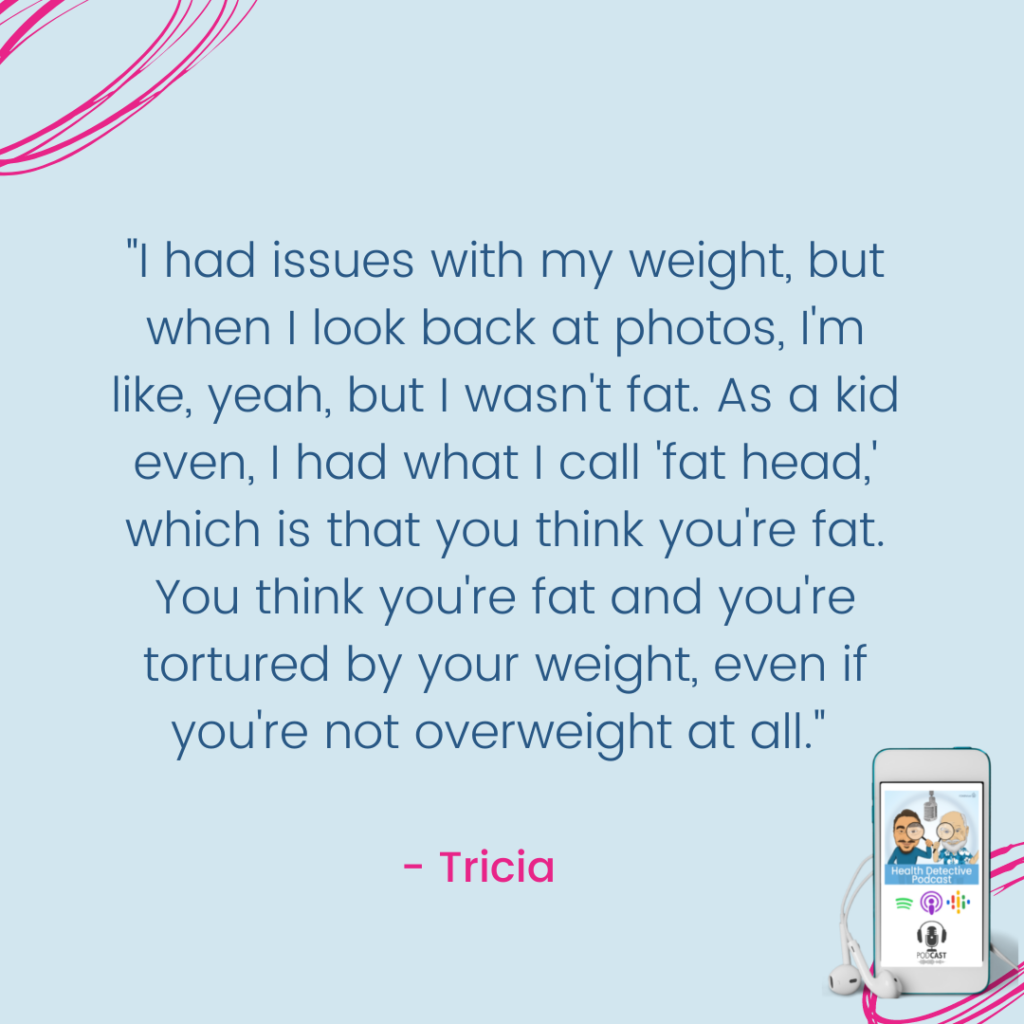
So really, I think as far back as I can remember, like age three or four. I started to really be concerned honestly throughout my whole childhood. I had issues with my weight, but when I look back at photos, I’m like, yeah, but I wasn’t fat. As a kid even, I had what I call “fat head”, which is that you think you’re fat. You think you’re fat and you’re tortured by your weight, even if you’re not overweight at all. That was the truth for me.
In adolescents, I did start to gain weight and by age 21, I was 50 pounds overweight. I definitely had a weight problem by then. I’d already gone through many diets, many exercise programs, pills, and potions and lotions. I was really at it, trying to get to the bottom of it.
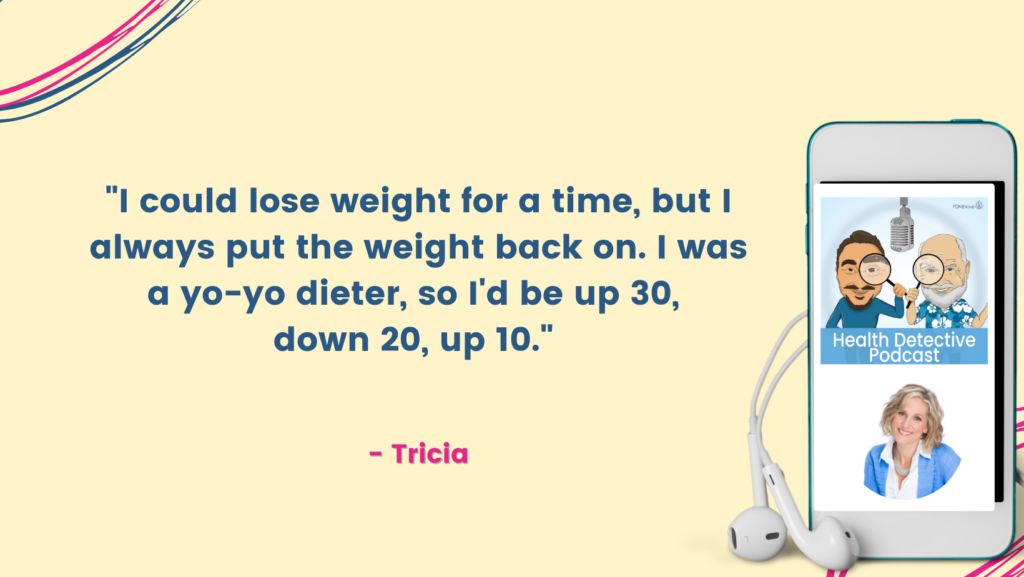
I could lose weight for a time, but I always put the weight back on. I was a yo-yo dieter, so I’d be up 30, down 20, up 10. I had five different sizes of pants in my closet, cause I never knew what size I’d be. You know, you always hold out hope for the skinny jeans. That was where I was hoping I’d get to.
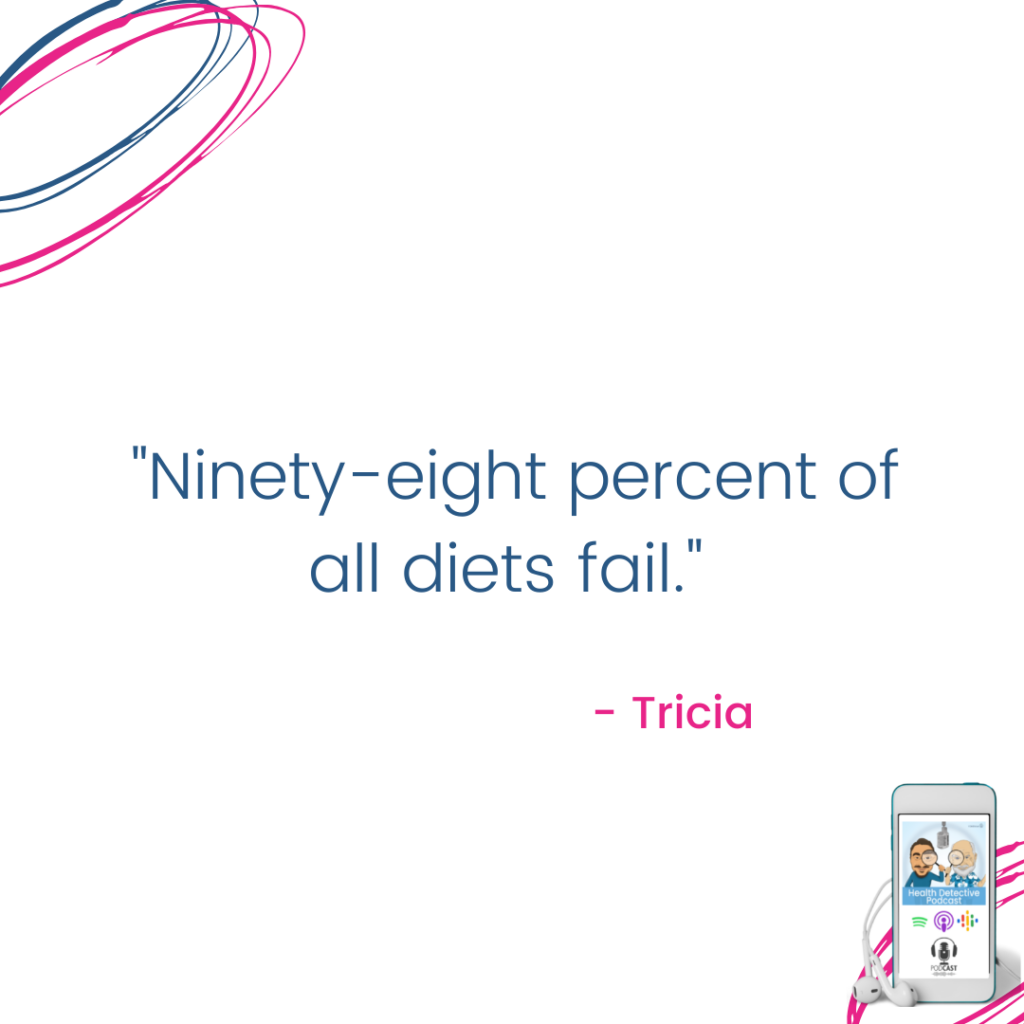
But I could be a hot second, and then I’d be back up the scale, which is typical for anybody dieting. Ninety-eight percent of all diets fail. That was my experience. It was very frustrating, and I hated being fat. I had a roll in my tummy that I would scrunch up in my hands and imagine cutting off, like you cut fat off the side of a steak.
Frustrated: Doing all the “Things” to Fix the Emotional Eating
I’d imagine getting some disease where I’d automatically lose weight without having to diet. I even thought about joining the Army where I’d be forced to exercise at bootcamp, cause I wasn’t. I hated it. I mean, when I was in binge mode, I hated the exercise.
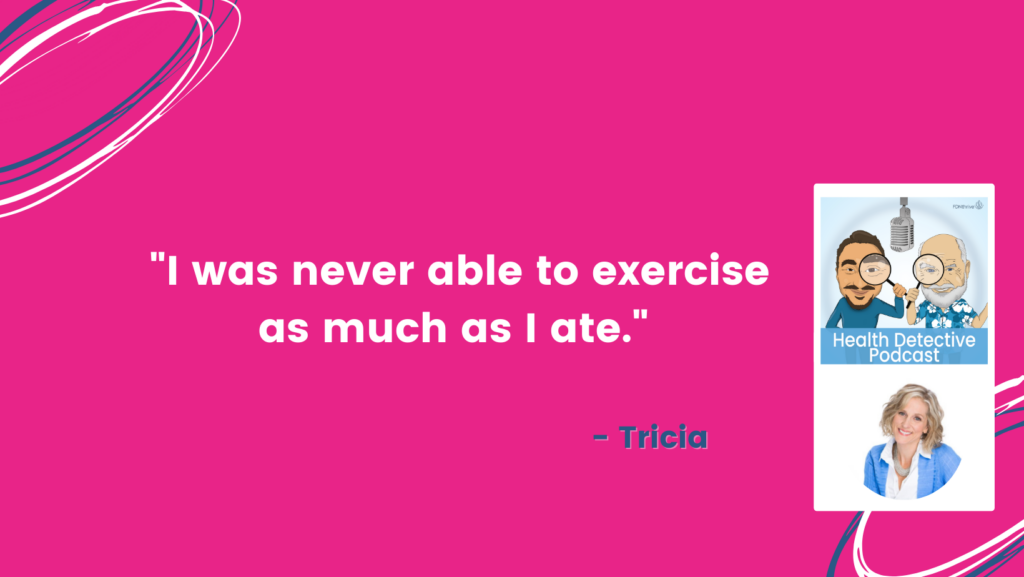
You know, I would just exercise to try to offset what I just been doing to myself. But I was never able to exercise as much as I ate. Cause when I was eating, I was eating high calorie foods. But that was kind of the rollercoaster ride and the torture I was putting myself under.
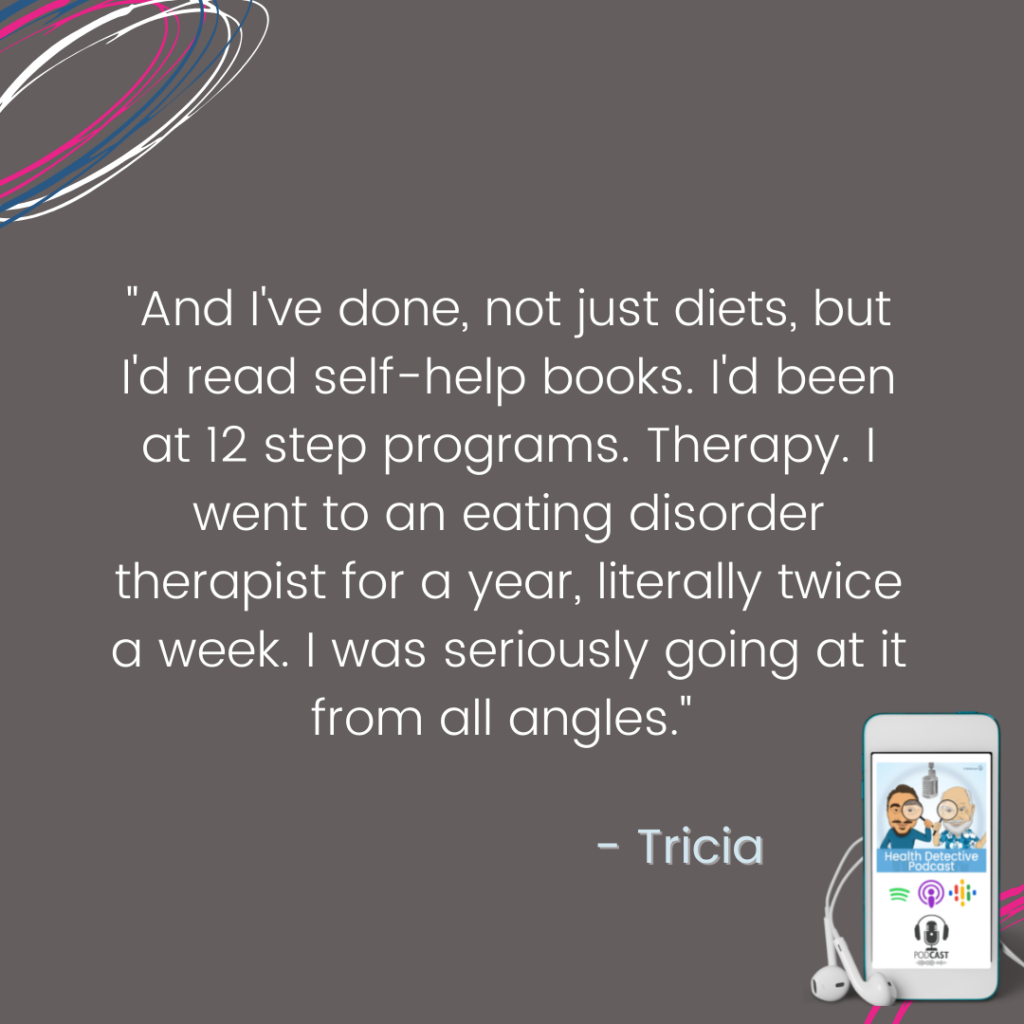
At some point, I just was like, man, I can’t keep doing this. This is so frustrating. I’m not getting anywhere and I’m trying really hard. And I’ve done, not just diets, but I’d read self-help books. I’d been at 12 step programs. Therapy. I went to an eating disorder therapist for a year, literally twice a week. I was seriously going at it from all angles.
But at the end of the day, I’m sitting there looking at cookies. I couldn’t say no. So, that’s kind of how it went for me. It does go way, way back in the work that I do with Heal Your Hunger. Comes directly from my intimate knowledge of what it’s like to struggle with food and weight and to feel so demoralized by that struggle.
[00:06:47] Detective Ev: This is so important because with what we’re doing at FDNthrive, some people can come in and they have health challenges, chronic disease, whatever. They might be recommended to make certain dietary changes. Some people, no problem. Come in and don’t even think twice about it. Then others, they can take the supplements, they’ll spend thousands on lab tests elsewhere, then come here and be like, all right, I’m going to try this too. Yet that’s the one thing that they can’t do. It’s like we have the path and it’s hard and I get this.
Emotional Eating Trigger
I don’t think I realized how much I got it until the last couple of years. Because when I was a kid, I would eat excessive amounts of sugar. You know those Hershey nuggets with the almonds in them?
Tricia: Yep.
Detective Ev: I used to eat an entire bag of those. It was disgusting.
[00:07:24] Tricia: I get it. I used to eat a bag of Hershey’s kisses. I think I’m a little older than you, so we didn’t have the nugget ones until a little later.
[00:07:32] Detective Ev: Yeah. But you know, it’s just like, you can eat this insane amount of food. Then I got into FDN. I never really had a problem initially changing my diet around and it was all good. I’m working with someone that does neuro-linguistic programming right now and they’re going back and tracing the thing. They’re like, well, you did have these good habits.
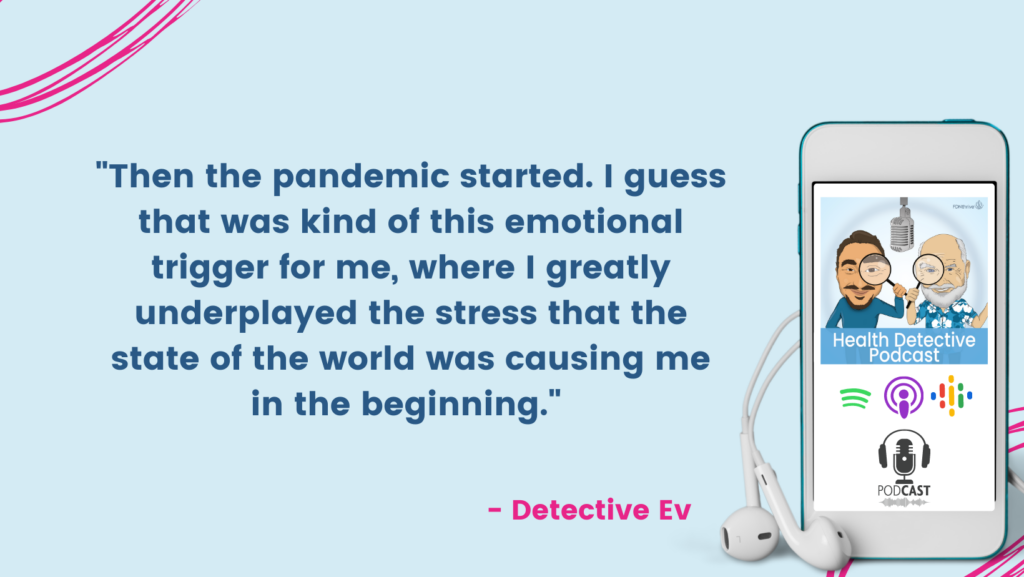
Then the pandemic started. I guess that was kind of this emotional trigger for me, where I greatly underplayed the stress that the state of the world was causing me in the beginning. And I went from this guy who for a couple of years, perfect.
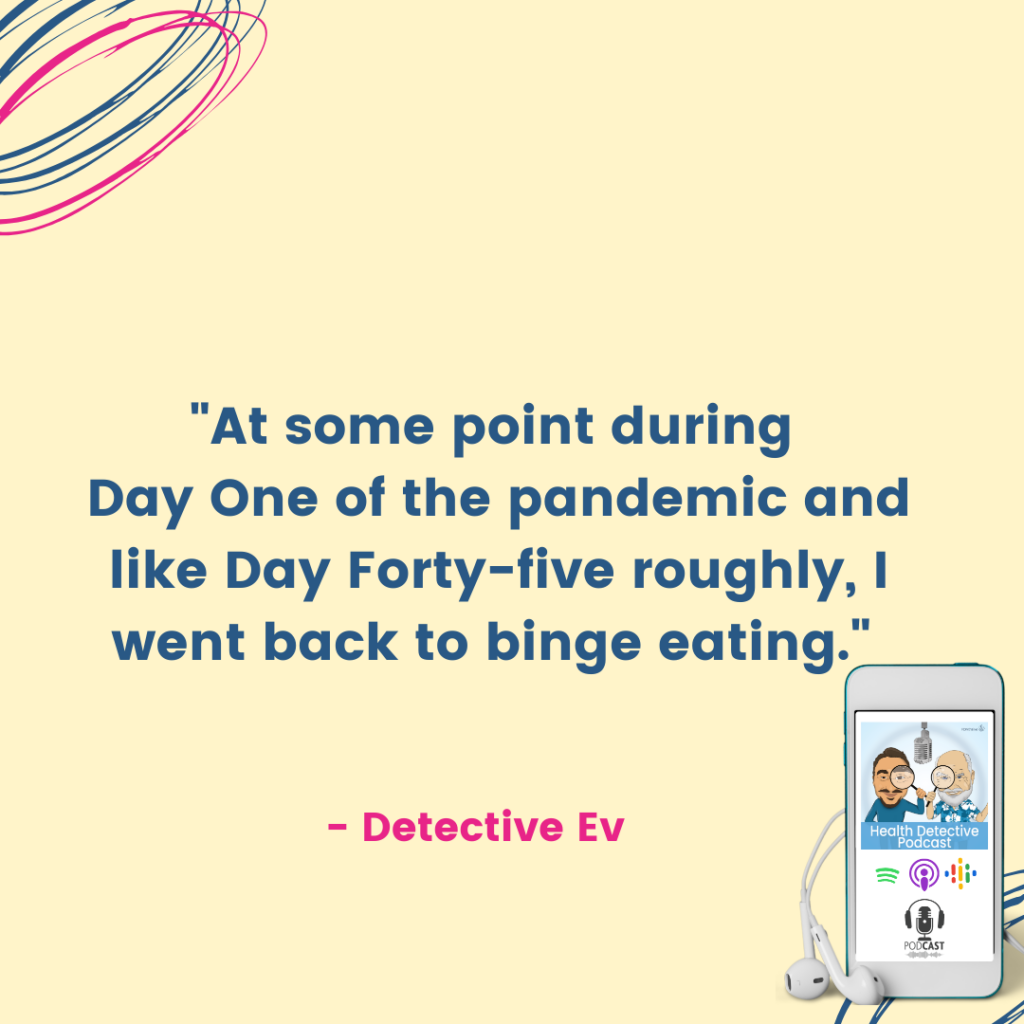
I had severe, severe cystic acne at one point, all cleared up. Never even get a breakout, not like it’s a big deal now. But still I’m getting these things again here and there. I look, and I’m like what happened? Because at some point during Day One of the pandemic and like Day Forty-five roughly, I went back to binge eating – like eating an entire bag of granola where it’s like 2000 calories, cause it’s like this paleo granola, or allowing sugar in occasionally.
The Yo-Yo Roller Coaster Ride in Emotional Eating
I like your one title that we’ll talk about today – the “I Quit Sugar” thing, because I thought I quit this. I thought I was done with this, and it lasted for years. What I’m getting at here with this is you had said that you did this yo-yo dieting thing, and you would get 30 pounds down sometimes then go back up. Why do you think some people have the ability at any time to do that? Because you’re not doing that in a day. I’m sure that took weeks if not months. So, something’s going right for a relatively fair period of time.

Why does that happen? Because that’s such a common story where people can do something in the right direction. They can clear their skin up in my case, or they can get the weight down and then it comes back. What happens there?
[00:08:59] Tricia: Well, I think that it’s really hard for somebody who has disordered eating or binge eating or some kind of history with chronic dieting. It’s hard for these people, in my experience (me being one of them), it’s hard to be cured, which might be depressing for somebody to hear. I’m not cured. You know, I’ve been living in a thin body for 30 years. I have freedom around food. Quite frankly, some days I’m in awe of how normal I seem.
Once an Addict, Always an Addict
But it’s not lost on me were I to stop doing the things I do that I teach others to do as part of my step-by-step system to heal. Which I’ve really nailed it, I’ve nailed the system for how to overcome emotional eating. But I am an emotional eater. The thing about that is if somebody is an emotional eater on the higher end of the spectrum (and we can talk about the spectrum in a bit), it doesn’t get up and walk away on its own.
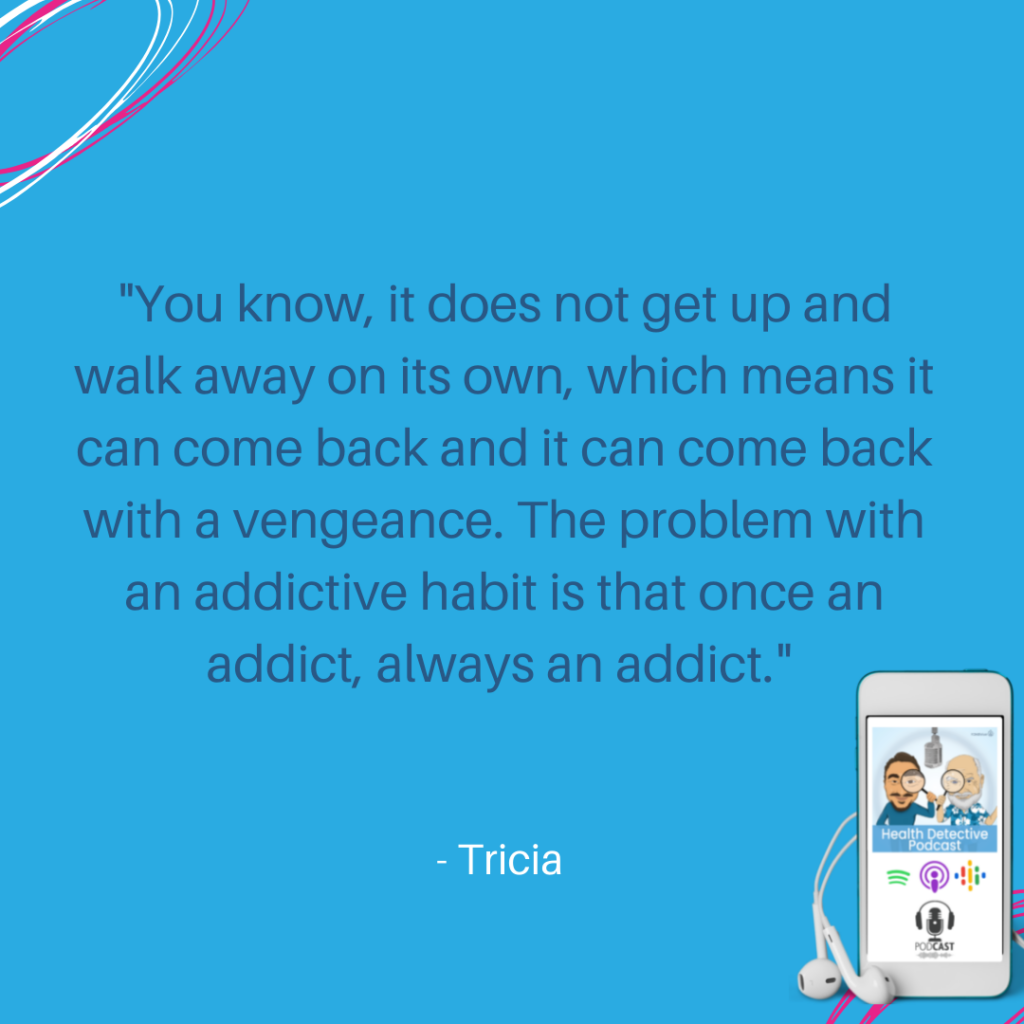
You know, it does not get up and walk away on its own, which means it can come back and it can come back with a vengeance. I have lots of people say, I was doing great until the pandemic hit, you know, so it’s very typical. The problem with an addictive habit is that once an addict, always an addict.
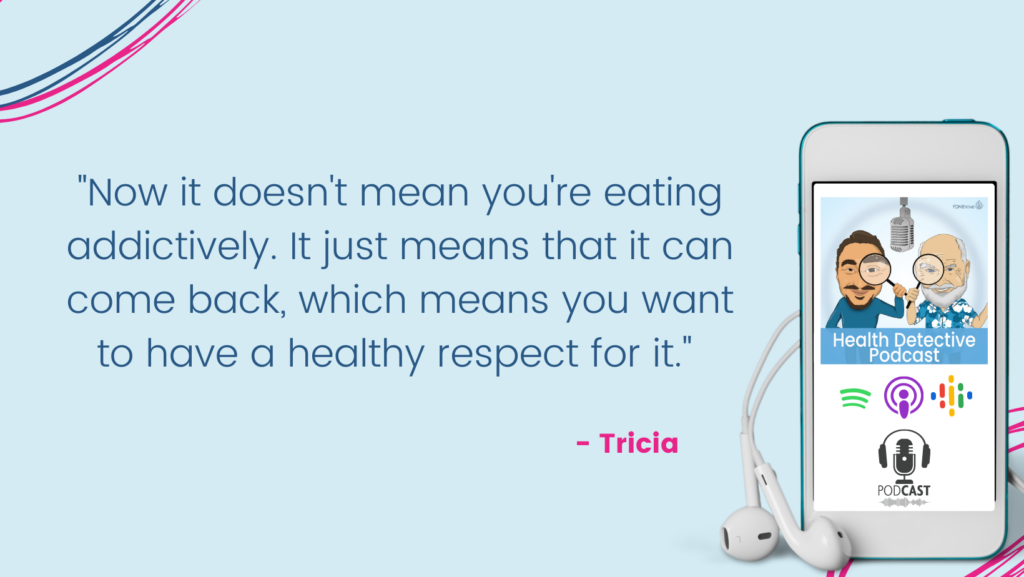
Now it doesn’t mean you’re eating addictively. It just means that it can come back, which means you want to have a healthy respect for it. And you want to keep doing the things that you did to get that health. The tendency for us is I’m good now. I’m going to go eat whatever I want. Like, I’m at the weight I want. Of course, then we put the weight back on.
Somebody is very blessed to have a speedy metabolism, most people don’t, you know. So, you have to be vigilant. It’s kind of a funky thing. I mean, it can come back, but you can live in freedom. It’s sort of like somebody who is diabetic. You can change your diet if you’re type two. You can change your diet and your exercise, and you can stop being type two. You can get your numbers down and you can be diabetes free.
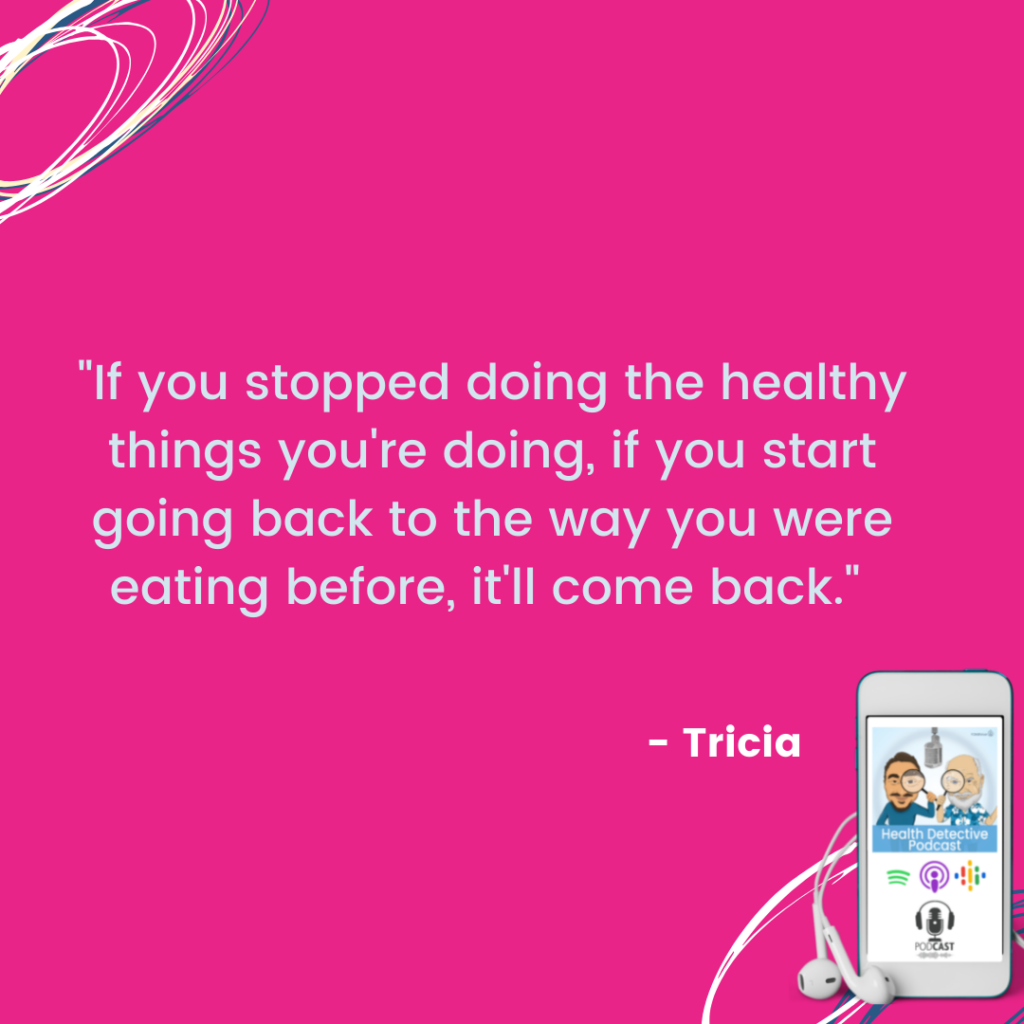
But it can come back. If you stopped doing the healthy things you’re doing, if you start going back to the way you were eating before, it’ll come back. It’s kind of like that as an emotional eater. I live in freedom every day, but I know that if I don’t do the things I do to stay in freedom, it can come back.
And that’s true with an alcoholic. That’s true with any kind of addict. So, if you’re, again, on the higher end of the spectrum of emotional eating or food addiction, you have to be forever vigilant. And that’s what I show people how to do. And it’s not hard to do, but you can’t act like, oh, I’m good now.
Emotional Eating is a Journey

And it can also transmute itself. Let’s say somebody has anorexia. A lot of times people go through this. The journey with food and your relationship with food is a journey. It’s a good word for it because it takes many different forms. You can like be anorexic and somebody’s anorexic in their teens cause they have a lot of control, a lot of restrictive control.
They’re anorexic, but then they lose that restrictive control, then they’re overeating. Then they’re like, okay, I’m going to purge to get rid of this food, cause I can no longer keep myself from bingeing. They’re bingeing, they’re purging.
So, they’re now bulimick and then that takes it’s toll. They ruin their esophagus. They ruin their teeth, the enamel on their teeth. Their life is unmanageable. They’re like, okay, stop the purging. But they’re still bingeing. They still have this tortured relationship with food where they have to have it.
Different Faces of the Same Problem in Emotional Eating

Now they’re just over eaters and they’re gaining weight. They can’t control it through purging or restricting. But to me, it’s all the same. It’s different faces of the same problem to me. That’s why I love the term “emotional eating” because it’s a good umbrella term for any kind of disordered eating.
We have orthorexia. Orthorexia is when you’re super hypervigilant about what you put in your mouth, similar to anorexia. It’s pseudo healthy. You know like how many grams of fat are in something or you know about your ketones. Then it’s like you get really dialed in with health. Or you’re vegetarian or vegan, or you got all the best recipes, vegan recipes, or sugar-free this, or whatever.
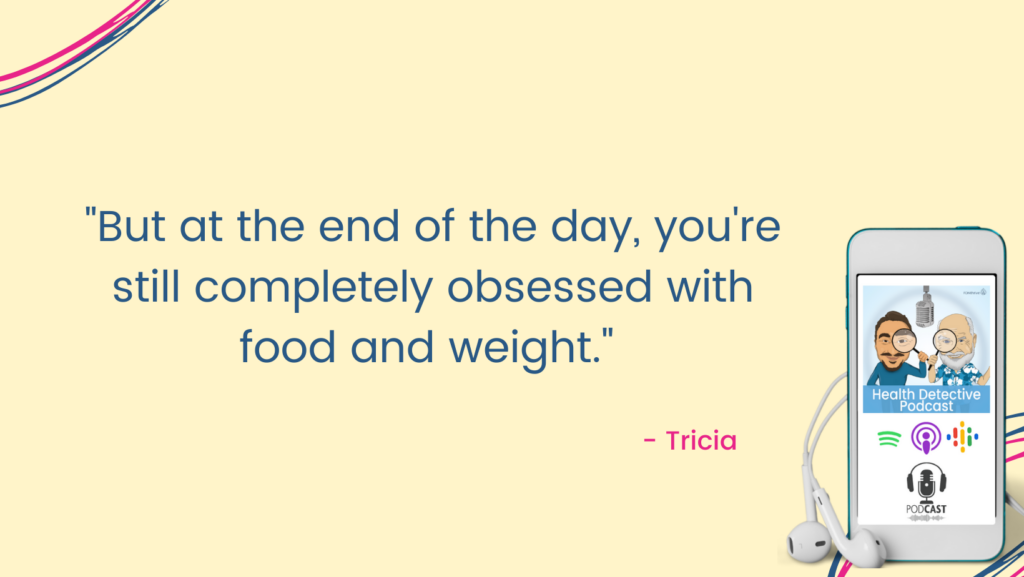
But at the end of the day, you’re still completely obsessed with food and weight, you know? That’s another face of it. To me, I want to be in freedom. I don’t want to be restricting. I certainly don’t want to be overeating and I don’t want to be obsessed period, because that’s not freedom.
It’s just really important to know that emotional eating is a journey. It takes many different forms. And to heal, you have to go deeper than the symptom, like FDN. That’s really what we’re talking about. But it’s tricky, it’s insidious. And it can come back with a vengeance.
It was kind of my point when I started on this rant.
[00:13:45] Detective Ev: That was so many great things to touch on. I liked that you use the word addicting or addictive because that is how I look at a lot of this stuff, especially in the bingeing category.
Constant Balance is Needed
It’s so weird. I’m like more of a spiritual guy, people on this podcast know that. And I feel almost like attracted to this conversation in a sense, cause you’re helping me already connect dots. I would’ve considered myself addicted to sugar like four or five years ago, but it’s almost like you forget or worse yet, I think what I’ve done is come from a place of ignorance of not considering it a real addiction where this quite frankly might be of one of the realest addictions I’ve ever had.
And I’ve been someone who’s definitely been subject to that stuff. Again, people on this podcast know like history of substance abuse stuff. And here’s what I wanted to bring up because I think this is where it’s particularly tough, because you said the person isn’t going to be ever cured. And I do agree with this.
If you’re an alcoholic, no one in this world that’s worth half their salt in like the world of addiction, is going to say, well, listen, go have a drink every weekend, but just one. That’s fine. No.
Tricia: Moderate.
Detective Ev: Right. Yeah. Moderate. How are we supposed to stop eating food?

Of course, you could say there’s different categories. There’s like your processed, artificial sweeteners, and high sugar foods versus other foods. I get that, but we are still doing the action in every single way of consuming that food. And you can’t give that up. You’re not just gonna live off fresh air and water. That’s not going to happen. So, I think that’s why maybe, even in my own life, and obviously the people that you’ve seen, there is this constant balance. I didn’t think that this could ever come back. I didn’t even realize how bad this was before.
For me, I never purge, but there’s a bingeing thing of like, yeah, I eat calories. I mean, I can down 2000, 4,000 calories in a meal. Usually not on that higher end, thankfully, but like 2000 is nothing for me. It’s nothing. I’m 170-pound guy, six feet tall. Just a joke. I can get that down and continue on with the day. And I know I don’t need that much in any given meal. I don’t know if you have any comments on that, but regardless, I would love to hear about the spectrum too afterwards cause you referenced that.
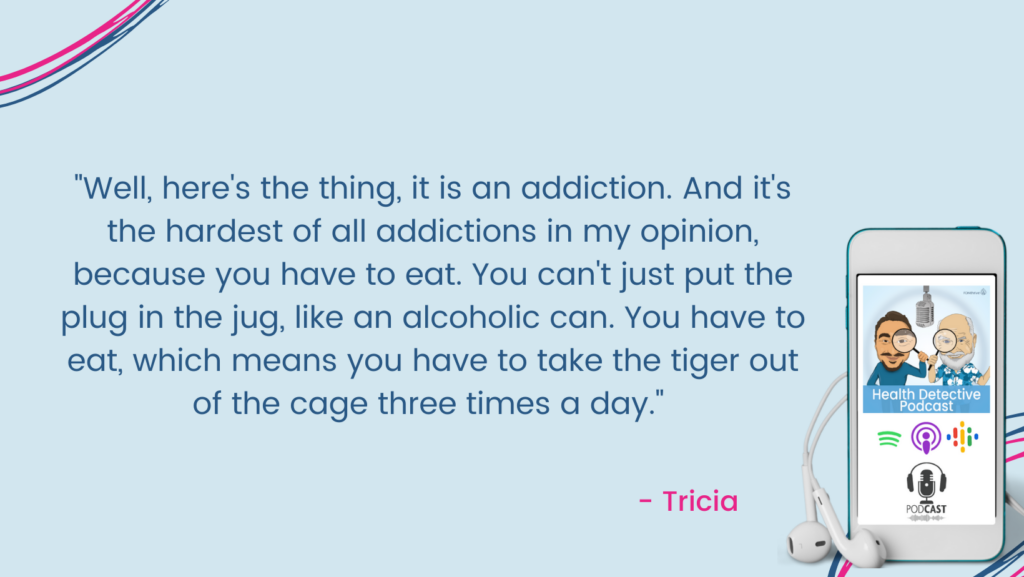
[00:15:33] Tricia: Well, here’s the thing, it is an addiction. And it’s the hardest of all addictions in my opinion, because you have to eat. You can’t just put the plug in the jug, like an alcoholic can. You have to eat, which means you have to take the tiger out of the cage three times a day. Try to pet the nice kitty and get it back inside the cage without getting your ass torn off. That’s hard to do. All the more reason why you have to get under it, you have to go deeper. Because just controlling the symptom, you’ll run out of steam on that.
The Emotional Eaters’ Spectrum

To answer your question about the spectrum, it really is a spectrum where emotionally eating is on the low end. I think we all are hard wired to have an emotional connection with food. So emotional eaters are on the low end and food addictions on the high end of the spectrum. Basically, I was totally a food addict. And I do have a quiz on my website, which will tell somebody where they are on the spectrum.
Literally you’ll get a personalized score and it’s a free quiz. It takes two minutes to take on my website, healyourhunger.com. But the point is that when you’re on the higher end of the spectrum, which I think most people, (as far as I can tell, and my experience which is decades now), anybody who struggles chronically with food and weight is on the high end of that spectrum. They’re likely close to food addiction, if not a food addict.
People get scared by the term addict. They really shouldn’t. It just means that you have some of the classic signs of addiction, which is like, you can’t stop once you start. Sure, that may not be true for a salad, but it’s probably true for chips and dip and Hershey’s kisses or Hershey’s almond nuggets.
And, you know, it might be true for other things like ice cream. I mean, I could never understand somebody taking a pint of ice cream out of the refrigerator, taking some of it, and putting it in a bowl. To me, that is a serving, the pint is a serving.
Detective Ev: It’s a miracle, right? Like how do you do that?
Tricia: I know. I always took the lid off and threw it away like we’re not using that lid again. The thing is that we eat in volume, but not always. We can be very controlled about things. But again, it’s not just the eating of the food. It’s the obsession.
Does it Take Over Your Mind?
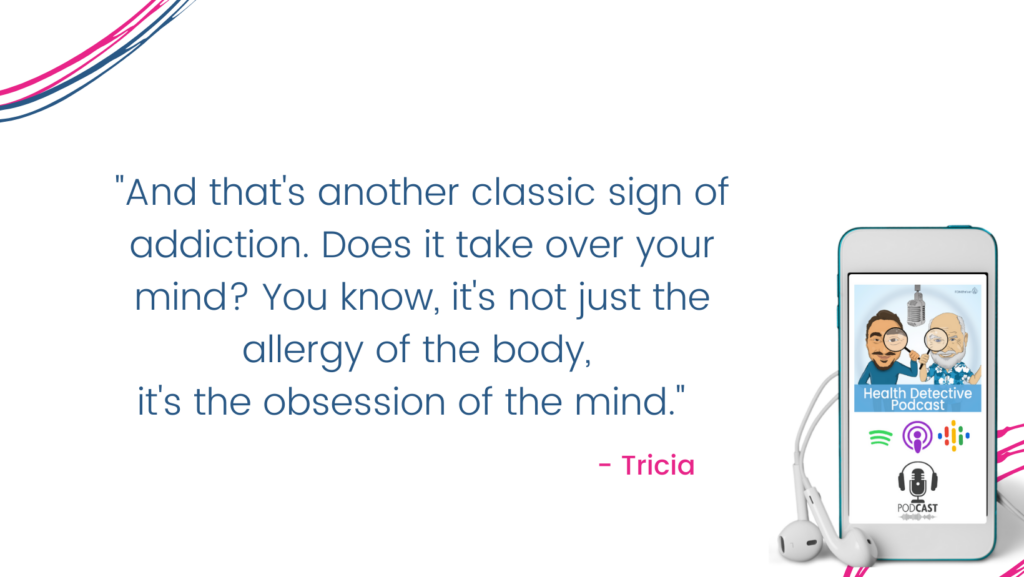
And that’s another classic sign of addiction. Does it take over your mind? You know, it’s not just the allergy of the body, it’s the obsession of the mind. That’s a big thing.
I am physically allergic to sugar. If I eat sugar, sugar’s all I want to eat. So, I’ve had to be really careful about that. It’s easier for me to not eat sugar at all, than to try to moderate my sugar intake. Because sugar definitely is a physical reaction. It’s a physically addictive substance. And carbs – processed carbs metabolize as sugar in our bodies, which is why carbs are hard to stop. So, there’s definitely the physical, but there’s the emotional as well.
Basically, if you’re on the high end of the spectrum, you have to do some drastic measures to change your eating. It’s just really important. I think that’s a good place to start is with that quiz, so people find out where they are. But the good news is that wherever you are, it’s all emotional eating. Like food addicts are definitely emotional eaters. Emotional eaters on a low end of the spectrum aren’t necessarily food addicts.

But I like the term emotional eating in general, wherever you are on the spectrum, because that’s what we’re dealing with. We’re dealing with stuffing our emotions with food. That’s what’s going on and that’s what needs to be healed.
Quit Sugar Challenge
[00:18:50] Detective Ev: Do you think it’s fair to say that there’s obviously a physical dependency here to some degree?
I mean, people get literal sugar withdrawals. I’ve experienced this myself. That’s what, again, it comes down to this “underestimating it” things. So hopefully, people give themselves some grace when they’re listening to this. There is real withdrawal symptoms. Since we don’t think about it like that, most of us at least, we might not even be realizing we’re withdrawing right now.
If your buddy’s withdrawing off a drug, you’d give them a little break. You wouldn’t expect them to go work 12 hours that day. Show them some grace. Show yourself the same thing with the sugar stuff.
But what I wanted to ask is since there is this physical and emotional side, do you think for some people, the emotional side kind of triggers it and then eventually you’re stuck as like this physical type of addiction? Because I feel like that’s what happened to me kind of.
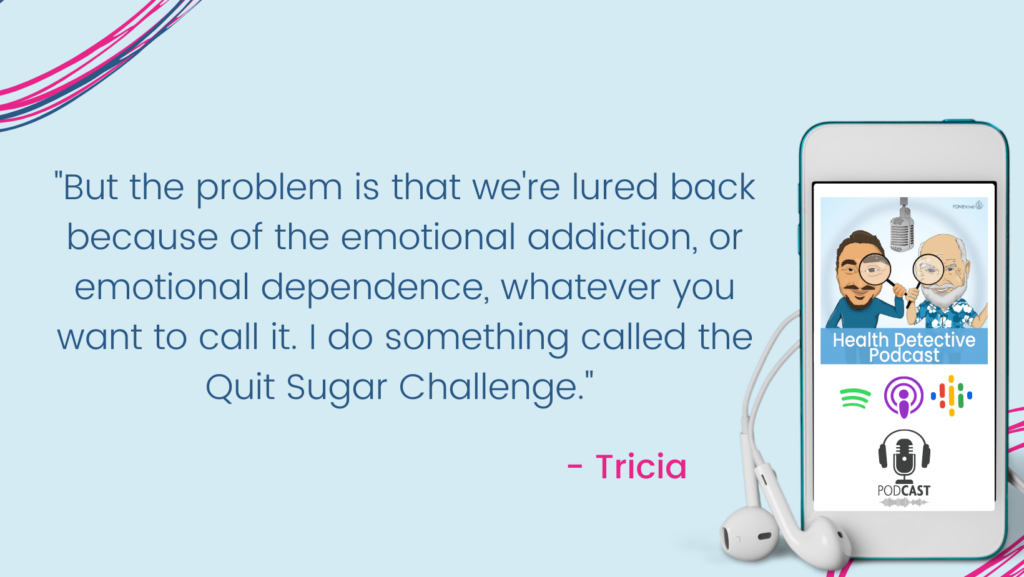
[00:19:31] Tricia: Yeah. Well, it’s true because if it were just a physical addiction, do a detox, get sugar out of your system. In five days, you’re good to go. You’re good to go. But the problem is that we’re lured back because of the emotional addiction, or emotional dependence, whatever you want to call it. I do something called the Quit Sugar Challenge. In my Quit Sugar Challenge, I do mindset calls as well as the mechanics of quitting sugar, getting it out of your cupboards, knowing the 80 different names for sugars, so you can find it. You can sleuth it out.
Using Sugar to Fill That Void That We Have
I cover everything in terms of quitting sugar. But the mindset calls are really what people love the most because that’s what’s really getting the best of them. People say to me, I don’t know how to quit sugar. Like, it’s my best friend.

This is how I get by. This is what makes me happy, you know? It’s that void that we have that we’re using food to fill that has to be addressed alongside of getting clean from the physical addiction. Because if just doing that, I’ll tell people you can be with me for five days and quit sugar, but you’ll be back to it, you know, in 1, 2, 3, 4 weeks.
First of all, sugar is everywhere. Everybody’s pushing it. It comes in really pretty packaging. It’s socially acceptable. Everybody brings it to parties. Everybody’s doing it. So, it’s really important that we get support to do this, but we also have to go deeper and deal with the emotional dependence. Without getting tools for dealing with your emotional dependence, just having it out of your system isn’t enough, because you will go back to it.
[00:21:09] Detective Ev: My NLP coaches have been so helpful lately. Because a coach, one of the great things that they do is they make you realize things about yourself that you don’t even realize. Like, I know I’m taking a certain action, but there’ll be like, well, have you realized that this action connects here and there and whatever.
Learn to Process the Emotions in Emotional Eating
So, one of the things I do outside of this like FDN stuff, Tricia, is I speak in the mental health space, but not actually about functional medicine per se. I speak in schools to kids and it’s mostly just a motivational mental health story. Now, when you’re doing that, I’m sharing some of the hardest moments of my life and not ever really registering that’s what I’m doing.
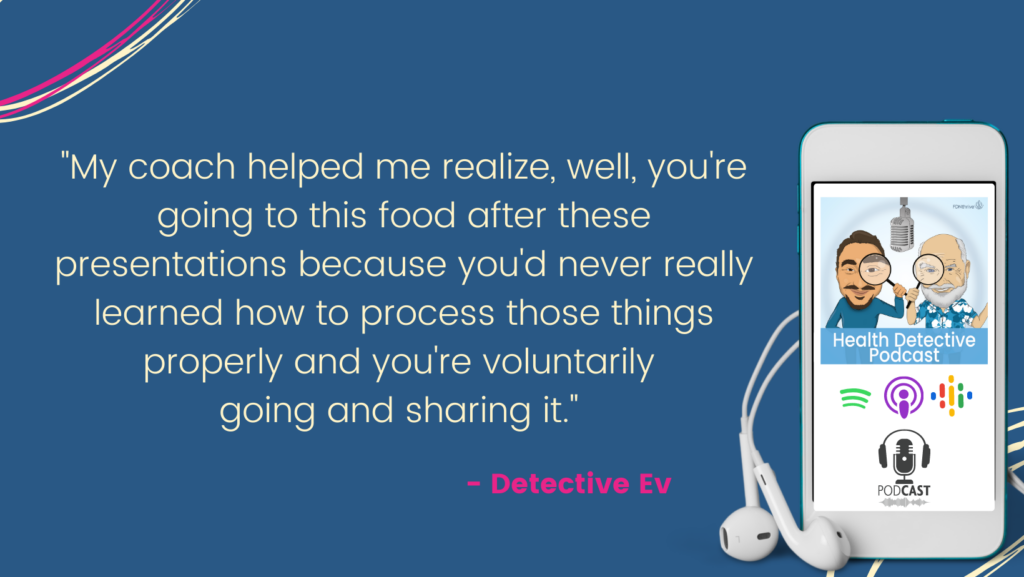
I’m like, oh, this is my life. It’s like, no. This was emotional and you’re getting emotional in the presentation. So, my coach, Gabriela, helped me realize, well, you’re going to this food after these presentations because you’d never really learned how to process those things properly and you’re voluntarily going and sharing it.
But then when I asked you about like the physical thing, cause this is the problem. I’ll trigger it with that. Like summer, I’m good. I chill the hell out, because I’m not really speaking in schools. But the school thing starts. Now even when it’s not a school day, when I’m not like actually speaking in a school, I still have that obsession where I am making plans to go get like my favorite sugary product.
It’s like, I can’t wait to get off this podcast to go get this, or I can’t wait to finish up this work so I can go get that. I’ll drive 30 minutes out of the way just to get a specific thing that I wanted. Okay Ev, this sounds a lot like when you were abusing substances, my friend. But it’s sugar, so you don’t think about it the same way. I think that spectrum thing is super helpful for people. I hope that they take that into consideration and use that quiz.

Also, what I love about what you’re doing here is I love things that happen to be perfect, working in alignment with what we do at FDNthrive. And I think what you’re talking about here is either something people should be doing simultaneously or even preceding an FDNthrive type of program. Get that food stuff right. Don’t let that be the reason that you’re dealing with the chronic health issues, cause we can help you here. But that stuff has to be managed a little better beforehand.
The Moderation Lever Doesn’t Exist in Emotional Eating
I know that you say you never cured whatever, but you said it’s almost been like 30 years now that you’ve been a relatively normal weight. Was it 30 years ago already that you started really figuring this out and what your triggers were and how to manage it for yourself?
[00:23:11] Tricia: Yeah. I was super blessed in my early twenties to get help and to get help to go deeper and deal with the underlying causes.
I had a mentor that had been obese and was a spiritual mentor and helped me heal. Then we worked together for many years and then I parted ways with him. We’re still friends, but I, business-wise, about five years ago, founded Heal Your Hunger to really help people online. I codified the whole process.
I put it in my book, Heal Your Hunger: Seven Simple Steps to End Emotional Eating Now. It’s so nice that it is in a step-by-step process because it’s very clear cut. I find that oftentimes when it comes to disordered eating, there’s advice out there that’s a little nebulous. It’s not bad advice. It’s just nebulous and hard to really put into practical terms like moderation.
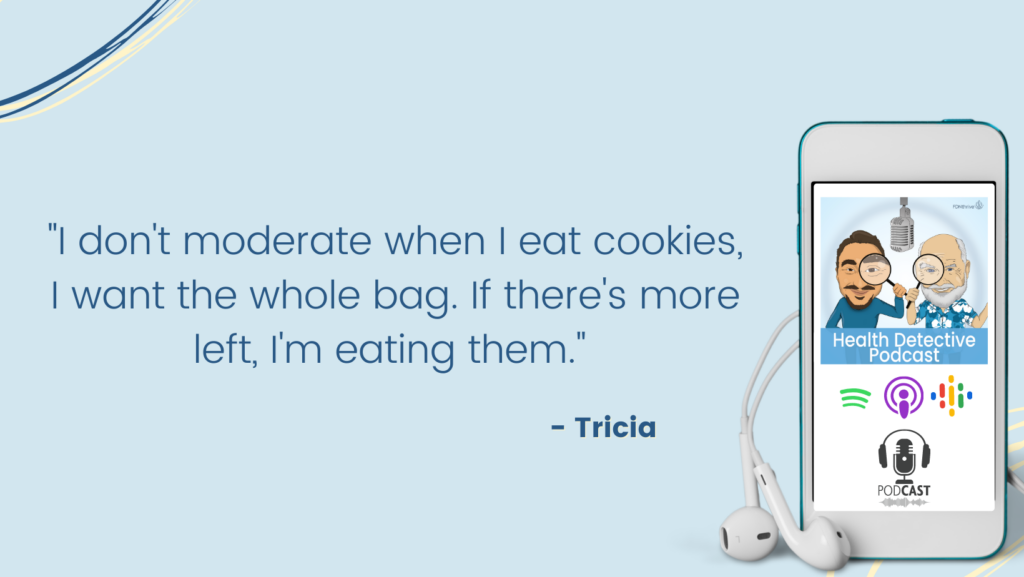
We talked about moderation. Like, how do you do that? I don’t moderate when I eat cookies, I want the whole bag. If there’s more left, I’m eating them. And well-meaning people and coaches and doctors and therapists will suggest moderation, but they don’t understand what it’s like to be me.

They don’t understand that I don’t have the moderation lever. Like I can’t do that. Once I start, I can’t stop. I’m addicted. That’s one of the natures of the telltale signs of addiction. So, moderation, intuitive eating, again, on paper, that’s a nice concept. Listen to your body, find out what you really want.
Intuition & Mindful Eating Don’t Work with Emotional Eating
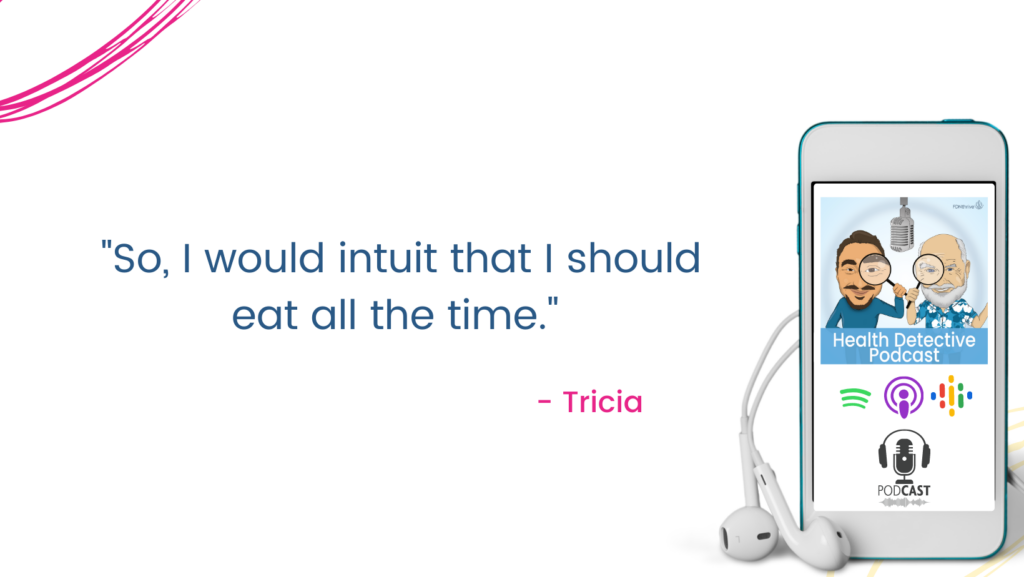
If you’re an emotional eater and you’ve got all these crazy emotions that are driving your eating, you can’t intuit properly. So, I would intuit that I should eat all the time. I’m constantly thinking, no, I think this is what my intuition is saying. But I was really just rationalizing cause I had a compulsion to eat.

When you have a compulsion, which is that gripping need and craving to eat, you can’t intuit properly. So intuitive eating, again, it’s a nice term, but it’s not very actionable when you’re an emotional eater.
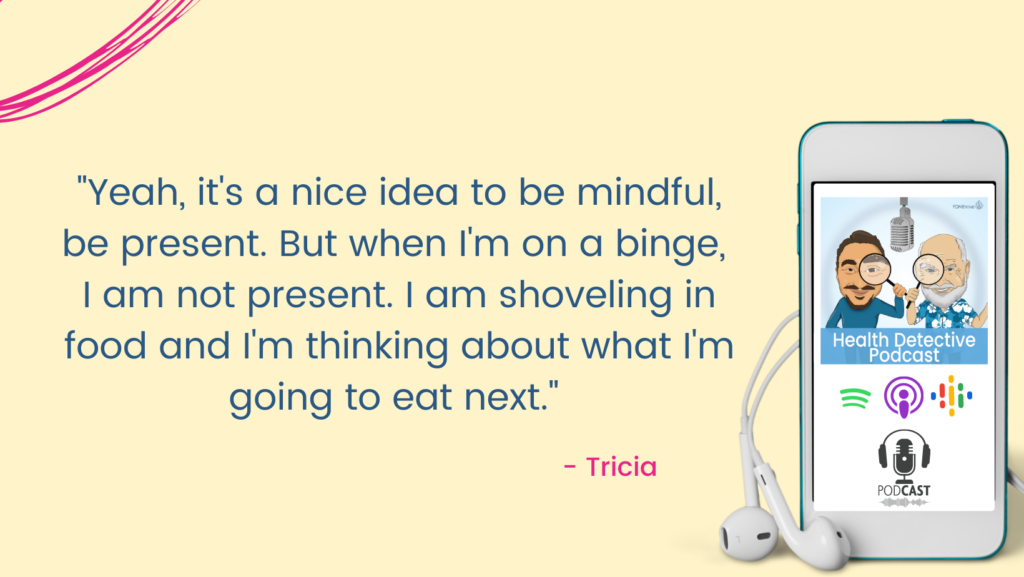
Another one is mindful eating. Yeah, it’s a nice idea to be mindful, be present. But when I’m on a binge, I am not present. I am shoveling in food and I’m thinking about what I’m going to eat next. And if it’s about to run out, I’m thinking about where I’m going to go get it. I’m not mindful. It’s a nice term, but it doesn’t hold a lot of weight for me, pardon the pun. Because I really need to go deeper, and I need to deal with this compulsion. That compulsion to eat cannot be controlled.
So, we are constantly dogging ourselves as emotional eaters because we don’t have more control. We don’t have willpower. We don’t, we just don’t. What we have to do is get underneath that compulsion and deal with it so that compulsion can be lifted.
I had somebody say to me the other day, Tricia, at 11 o’clock at night, I’m crawling the walls. I’ve got to eat. I’m on this super strict plan and I’m doing good all day long. And at night I’m just like this hungry tiger. It’s just really important to know that that compulsion can be backed down. That compulsion can be healed, but you have to get underneath it. You have to deal with the emotional causes.
Cravings are Not Intuition
You have to deal with the stress of the day, things that that compulsion is made of. Otherwise, it’s like trying to stop a wave. Go to the ocean, stand there at the edge of the beach, and try to stop a wave. It’s impossible. That’s how it is when you have that gripping compulsion to eat. So, we have to go deeper.
[00:26:39] Detective Ev: I love that you brought up the intuitive eating thing because I think that was very kind, but still firm. That’s gotten taken too far, and this is coming from someone who’s had the privilege of interviewing a young woman named Lily, friend of mine. You know what guys? Results don’t lie.
So, you can kind of see if it’s working for someone. Lily’s before and after photos are someone who was clearly starving. She shares all this publicly, lost her period, all this stuff. Her version of intuitive eating now is fit. She looks great. She’s glowing. She’s healthy. That is what she needed for her specific thing.
If intuitive eating is leading to severe skin issues or obesity, I don’t know that the body would ever do that intuitively. I’m not an expert, but I would imagine that’s not the case. There needs to be a line drawn about when this can and can’t be used for people, because cravings are not intuition.

If we were all like native Americans still, and we could easily identify the difference between our intuitions and emotions or whatever, that’s fair. But I think the concept again is actually perfect. If that really is something that you can tap into, it’s beautiful. But intuitions are getting confused with other things and I think that leads to problems for people. Again, the results don’t lie.
Emotional Eaters’ Personality
[00:27:41] Tricia: Yeah, no, it’s true. The truth is clear out the emotional baggage (and I don’t mean you have to go to 20 years of therapy, cause you don’t.) I make it really clear. If there was a mold made from emotional eaters, you could put us all in the mold and not a hair would hang out. So, we’re very common in the way we react to life. Again, this is where I take the guesswork out of it.
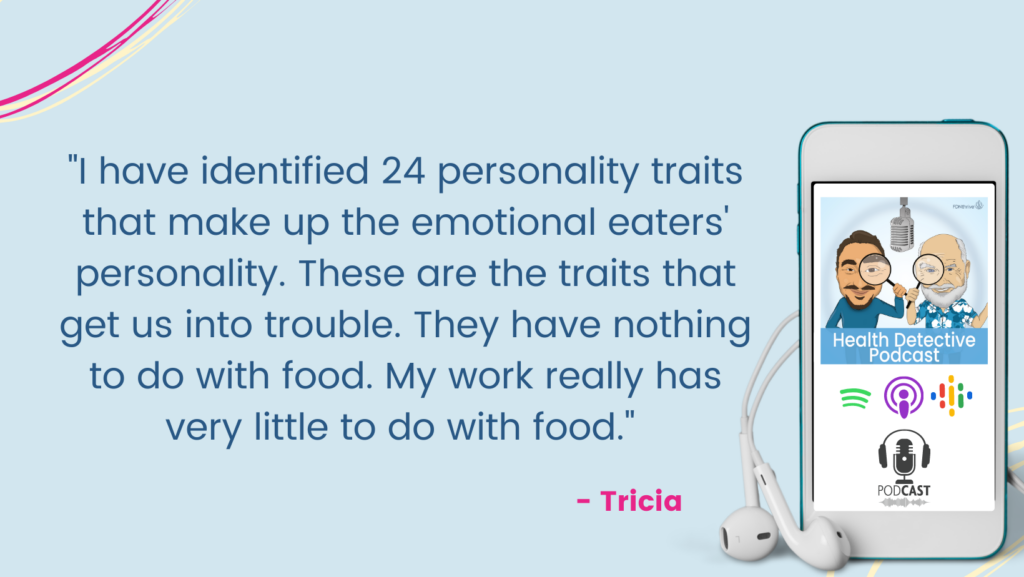
I have identified 24 personality traits that make up the emotional eaters’ personality. These are the traits that get us into trouble. They have nothing to do with food. My work really has very little to do with food. People know what they’re supposed to eat. They’re not stupid. They know salads are better than pizza or hot dogs. But we still want the fun foods.
It’s really about dealing with why we can’t follow through on the good health advice we know. This is true for health coaches, especially. Because it’s the worst position to be in when you’re a health coach and you can’t do what you suggest people do. You can’t walk your talk. It creates this terrible gap where you’re like, oh my God, I feel like a fraud.
And that’s going to affect your income. That’s gonna affect how you show up in the world when you’re hiding and living this double life. It’s really a big problem when we have all this health knowledge, but knowledge won’t fix us. We have to be able to follow through on what we know.
People-Pleasing Trait in Emotional Eaters

So, clear out, change the certain things that are trouble spots, things like people-pleasing. This is the top trait of the anatomy of the emotional eater. I call this the anatomy of the emotional eater. People-pleasing is the number one trait that gets us into trouble because as emotional eaters, we typically want validation from outside ourselves more than your average person.
Why? Well, typically we didn’t grow up with a strong sense of self-esteem. So, we’re always looking for the “attagirls” or the “attaboys” outside of us. We’re constantly saying yes, constantly trying to please people with taking on projects, being like super perfect in things that we do. But then that adds all this pressure and stress that we go home and stress eat over.
And especially when we’re also resentful, because nobody’s ever as pleased as we plan on them being. We’re kind of like, I did all this work and all I got was a “thank you.” So, these are things that are, I often say it’s a living problem, not an eating problem. Everybody’s trying to fix their food, but they need to fix their life.
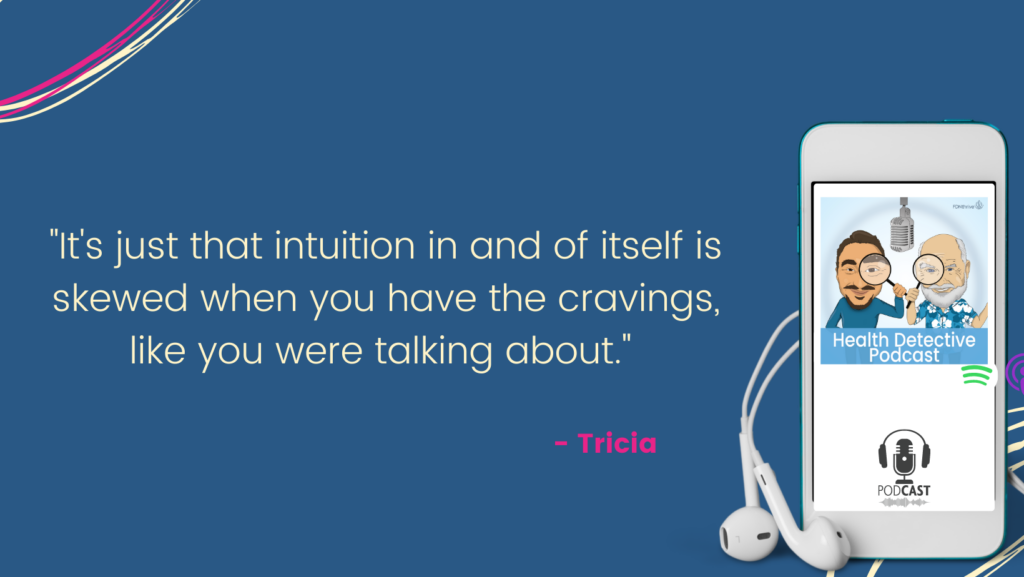
It’s the way we’re living that’s causing problems. Addressing these traits is so, so important. If you do that, then you can hear your intuition. If you have a morning routine of reducing stress like meditation, or prayer, or yoga, things that can help you get connected and centered, then you can tap into your intuition. They’re not mutually exclusive. It’s just that intuition in and of itself is skewed when you have the cravings, like you were talking about.
So, you got to do the deeper work and clear away the problem spots in your life that are causing cravings so that you can tell the difference between a craving and intuition.
[00:30:36] Detective Ev: Going back to what you said before, like people aren’t stupid. They know what to eat. This pisses off so many people, but I feel like we have a very self-aware audience. This is cool. Every single one of us, myself fully included, knows what we can do to be doing better health wise right now, and finance wise.
If I asked you, you could tell me, but there’s something that’s blocking those actions in both those places. I use finances too, because it’s just an essential part of our lives. Yet we sit here and not do it.
Now, I’m not asking you to give away your secret sauce nor do we probably have the time considering how clearly in depth you’ve studied this, to go through all 24 personality traits. But I know that you mentioned number one is people-pleasing.
Do you think we can go through maybe the top, like three or four or something like that?
Overeaters Overthink
[00:31:13] Tricia: You bet.

So, people-pleasing, no question. Having a racing mind, big problem for emotional eaters. We overthink everything, as overeaters we overthink. It’s like, what did she mean by that? Why are they not talking to me? Should I call them back? You know, I don’t know what to do. If I do this, it’s going to piss those people off. If I do this… So, we’re constantly overthinking everything.
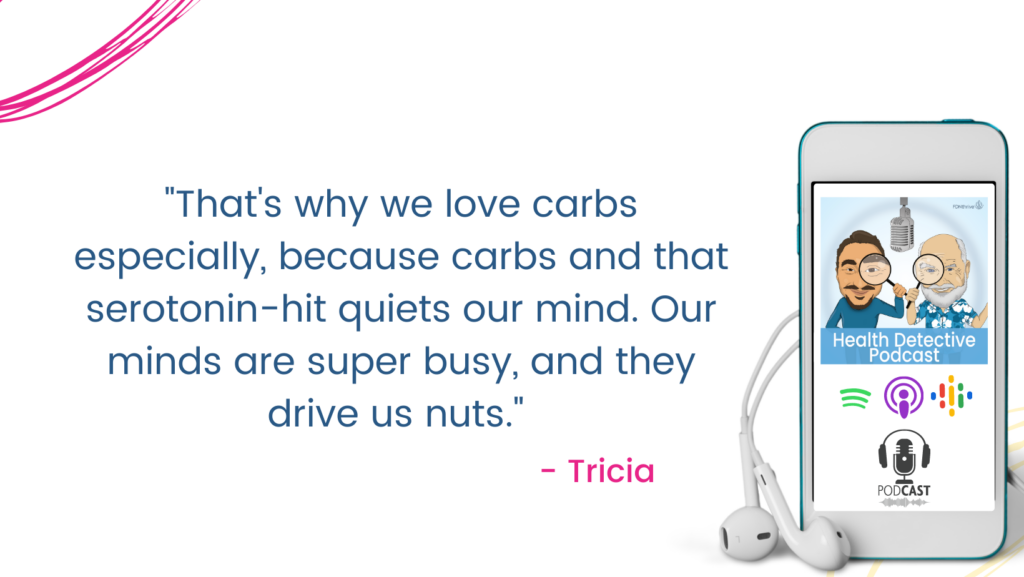
That creates all this stress and mind chatter that we want to shut down. That’s why we love carbs especially, because carbs and that serotonin-hit quiets our mind. Our minds are super busy, and they drive us nuts. They drive us absolutely nuts. So overthinking is a problem, that’s why meditation is so powerful for emotional eaters.
And that’s also why emotional eaters are like, I can’t meditate, my minds too busy. Well, that’s kind of the point. That’s why we meditate, you know? And I just tell people, stop judging it. Sit down, shut up. Just light a candle, say a mantra, whatever can help you slow down.
The hardest thing for an emotional eater to do is slow down. We’re over doers. We overdo everything. And we not only overthink, but we overdo. If you want something done, give it to an emotional eater. We are on the go all the time. Why? Because we’re running from ourselves.
We do not want to catch up to ourselves because we have all kinds of feelings we don’t want to feel. But the problem is that’s like a hamster wheel that you can’t ever stop. That’s why we’re exhausted all the time. That’s why our adrenals are so often burned out. Because we are on the run and we’re running from ourselves because we think we’re bad and we’re afraid to catch up to ourselves.
Emotional Eaters are Caretakers

There’s a lot going on underneath the surface. People are like, no, I just like chocolate. I promise you, it’s not just that. I like chocolate too, but that is not the crux of the problem. So over thinking, having a racing mind, over doing. Caretaking, we’re big codependents. We love to take on other people’s stuff.
So, if somebody’s hurting, we’re rescuing them. We’re rescuing them, we’re care-taking them. This often comes from a childhood, a dysfunction, or alcoholism. Oftentimes we’ve grown up with some kind of trauma, either alcoholic parent or raging parent, you know?
We were good at like picking up the slack. Good at being the responsible kid, which carries a price tag with it. We don’t get to have a childhood. So, we’re super responsible but we do caretake. And it’s really hard for us because we’re people pleasers also, it’s hard for us to set boundaries on our time.
That’s how we get into the overdoing cycle. We’re overdoing, then our adrenals are taxed. These are things that just come innately to us, but oftentimes they do stem from our childhood of trauma for sure. Some other ones, I’m just looking through my book here. There’s so many.
Fear is a Boogeyman
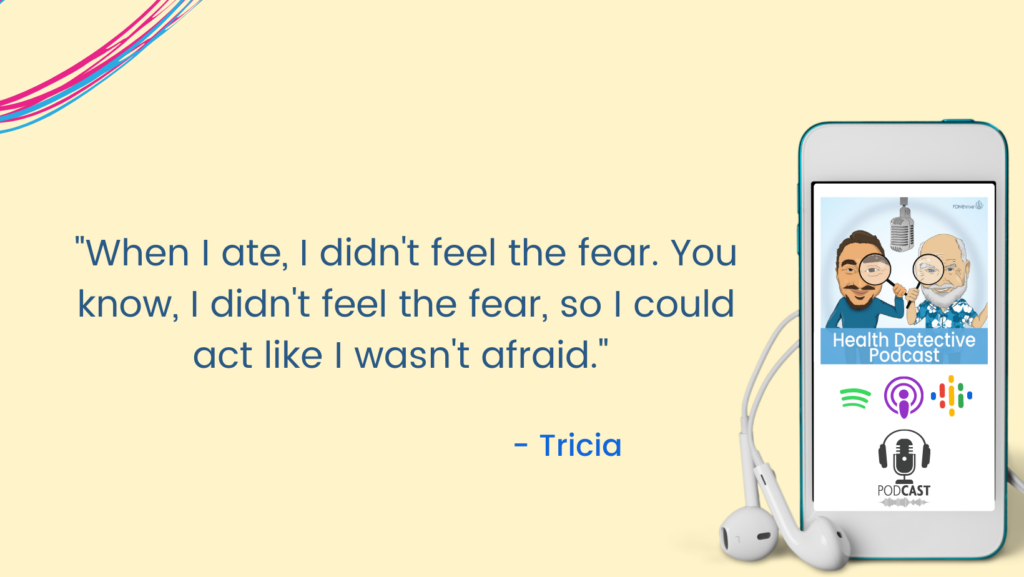
Fear. I find as emotional eaters, I was a total scaredy cat, and I didn’t look like it. Like I was bold. I did a lot of really courageous things, but underneath, oh my God, I was so afraid of everything. Life just scared the bejesus out of me. So, I would eat. When I ate, I didn’t feel the fear. You know, I didn’t feel the fear, so I could act like I wasn’t afraid.

But if I wanted to stop overeating, I had to get in touch with that fear and find new ways to bring down that anxiety level. Again, why meditation is so powerful, why community is so powerful because there’s power in numbers. So, I do all my programs in community. Because when you’re with other emotional eaters, it’s easier to have a healthy path. It’s easier to take the high road and make a healthy choice. It also brings down our fear. I do my programs on zoom. We do it in groups on zoom and all the ladies just feel so good every time we have a zoom meeting because the fear comes down.
And when you see other people doing healthy habits, you want to do healthy habits. It adds to the experience because that fear, that fear is a boogeyman. That’s where all that rationalizing comes from. Like, oh no, I should eat the donut. It comes from the fact that we have this stress, we have this fear, and it transmutes itself in a craving. But it’s not really the craving, it’s whatever it is that we’re trying to avoid in our life, because we have a lot of fear.
So those are some of them.
[00:35:37] Detective Ev: This is amazing. There are certain podcasts or certain interviews that I’ve done throughout time on a variety of topics. I happen to relate to this one. There’s some I don’t relate to at all. But there’s just some people that really really know their craft. And they’re not just out there kind of spitting BS.
Hitting the Nail on the Head with Emotional Eating
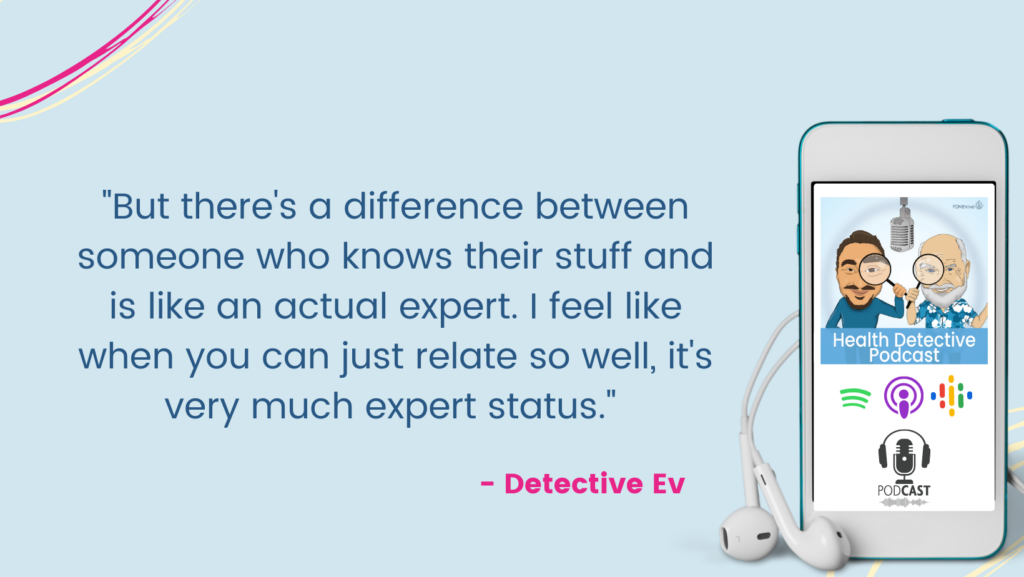
And I’m not suggesting that anyone on this podcast ever has. But there’s a difference between someone who knows their stuff and is like an actual expert. I feel like when you can just relate so well, it’s very much expert status. It’s cool. Because even like those first two things that you said, it’s not like a 50% relation to me, it’s like, okay, that’s dead on who I am.
You know, most people wouldn’t look at me as a people pleaser until you see my cell phone. It’s just interesting for me how all of this is coming up in this coaching. Like you said, it’s not really about the food per se. Maybe you develop some kind of physical things, sure. But at the end of the day, it’s the other stuff that’s doing it.
Comparatively speaking and FDN pays me well and other things that I do outside of this pays me well. But I’m like, you are working so much, and there is no way you’re making enough compared to these like 14-hour days. Like you’re just adding on stuff for the sake of adding on stuff.

Of course, the more stressed out you are, then you’re going to want food. Even a normal person would want that. Let alone someone that’s already prone to this. Yeah, totally, totally relate. I think you’re just hitting the nail on the head for many people out there.
You mentioned like ladies and stuff, and I know that again, stereotypically, I think women are just more open to the idea of emotional eating. I think it’s across the board. But your programs that you offer and the things that you do, do you have men in them?
Do you have people that are like me that maybe don’t gain weight, particularly easy, but they know they have an emotional eating problem. Who do you serve?
Tricia’s Step-by-step Process Works for Anyone
[00:37:04] Tricia: I primarily serve women, but in the past year I’ve started to take on men. I do it in a slightly different way with more one-on-one coaching calls.
So, it’s a small number of men. But as I get more interest, I will start the same program I have for women. I’ll do with men as well, where they’ll have the community with other men. But the nice thing is, is I have a really clear-cut system that’s all digitalized in modules. So, people, whether it’s men or women, they all relate to the content that I put out for overcoming emotional eating.
My step-by-step process works for anyone no matter who they are.
5-HTP, Serotonin, & Mental Health
[00:37:40] Detective Ev: Yeah. Not to jump points here, but you said a lot of great things. One of the things I wanted to recognize, as well is you brought up like the serotonin type of thing. Not that there’s not more complexity to this and that you don’t need more tools, but I always found it remarkable. I tried it last year when I was experiencing some of this, because there was no connection for me yet to the food.
I thought the feelings were leading to the food and to a degree, they were. Like, I kind of mean it a little differently than we’re talking about today. So, I might’ve said that confusing, but I think you guys know what I mean.
The point is I took 5-HTP thinking that depression or something was the issue again. And I hadn’t really dealt with depression in many years. I’m like, this is kind of weird for me. And the 5-HTP, I would notice, would work extraordinarily well. Now, again, there’s more to it than that because it didn’t work long-term. But it was kind of crazy how quickly that that would diminish the cravings for me.
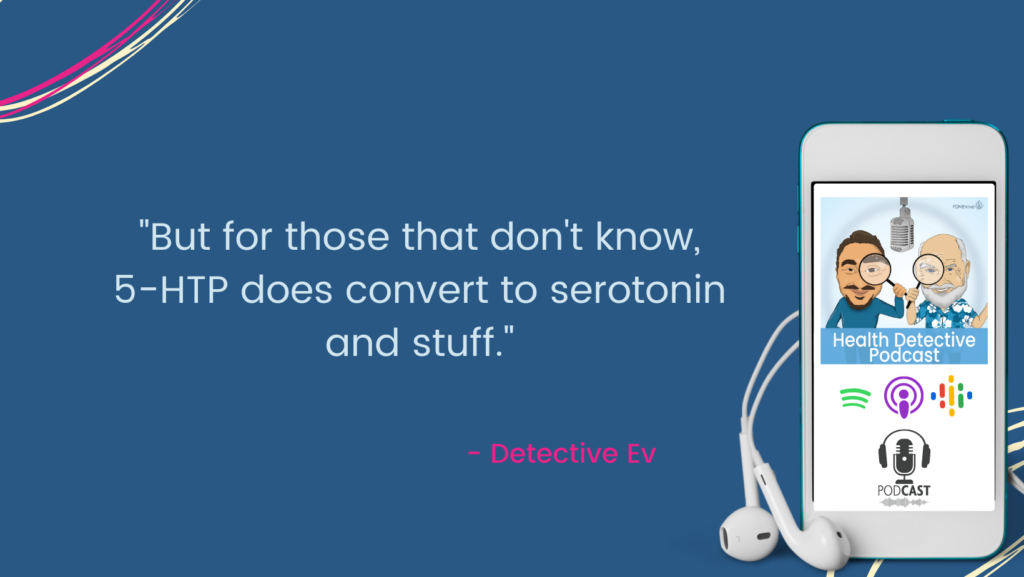
Guys don’t be stupid. Not everyone needs to start taking 5-HTP. For some of you guys, that might be a terrible idea, especially if you’re on an SSRI’s, so, it’s not medical advice. But for those that don’t know, 5-HTP does convert to serotonin and stuff.

For some people under certain circumstances, yes, amino acids can be wonderful things. I like them when just dealing with mental health clients and stuff like that. I thought that was interesting that you brought that up as well. We’re just trying to get that the best that we can. Many people don’t realize that. Yeah, like a high carbohydrate thing can actually give us that serotonin that we’re looking for, but there’s gotta be a better way to do it.
I feel like you offer many things, so I want to make sure that we have the appropriate amount of time to talk about all this stuff. Because again, I think for what we’re doing at FDNthrive where we’re really breaking down the labs and figuring out what’s going on with people from a chronic health issue perspective. Guys, I don’t care what chronic health issue it is, if you don’t get this stuff at least somewhat under control, it’s just not going to happen.
So, whether it’s in conjunction with FDNthrive or even proceeding it, I think if this relates to you, this is definitely a good person to be talking to and working with. Again, whether it’s book, podcasts, all this stuff, I’d love for you to honestly, just to shout it all out. Of course, we’ll put it in the show notes as well.
Where to Find Tricia
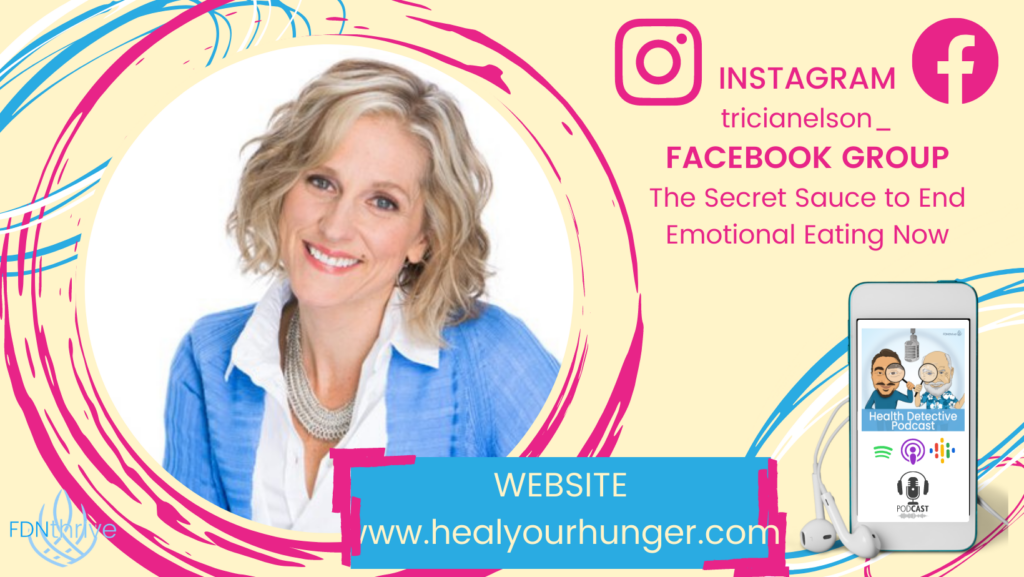
[00:39:35] Tricia: Great. Yeah.
My website is healyourhunger.com and that’s a great way to connect with me. You can actually access the book, there’s a link for the book. There’s a link for my podcast. There’s the quiz, the free quiz as well, and also a link for my TEDx talk that just came out, that I’m super happy about.
And I’m also on Instagram, Tricia Nelson_. I do have a Facebook group called The Secret Sauce to End Emotional Eating Now. But all that you can access through healyourhunger.com.
[00:40:07] Detective Ev: There’s been so many times throughout this podcast where you’re smiling while saying something that to someone could be really serious. But I love doing that. I think you can’t be too serious about these topics. Like, even with the mental health stuff, I’ll laugh about a panic attack. And someone gives me like, oh my God, you can’t say that. It’s like, Dude. You know, like it happened, let’s make the best out of it.
Tricia’s Magic Wand
I normally have a signature question on this podcast where it’s specifically about health in general. But of course, it’s from my understanding, it’s not like you were sitting here dealing with a cancer or some specific auto-immune disease. So, I think the final question for today could actually be best for this specific topic.
And so, in this case it would be, if we could give Tricia a magic wand and you could get everyone who is out there emotionally eating to do one thing for their emotional eating or stop doing one thing, what is the one thing that you would get them to do?
[00:40:52] Tricia: Oh, there’s so many. But I would say, I mean, there’s so many things to do, and they’re hard to do without support.
Most people, the emotional eating, want to figure it out on their own because they’re embarrassed about it. You can save yourself a lot of time by getting support. But in terms of a first step, like if you want to do it on your own and you’re like, screw you, I don’t want to get support. Basically, slow down.
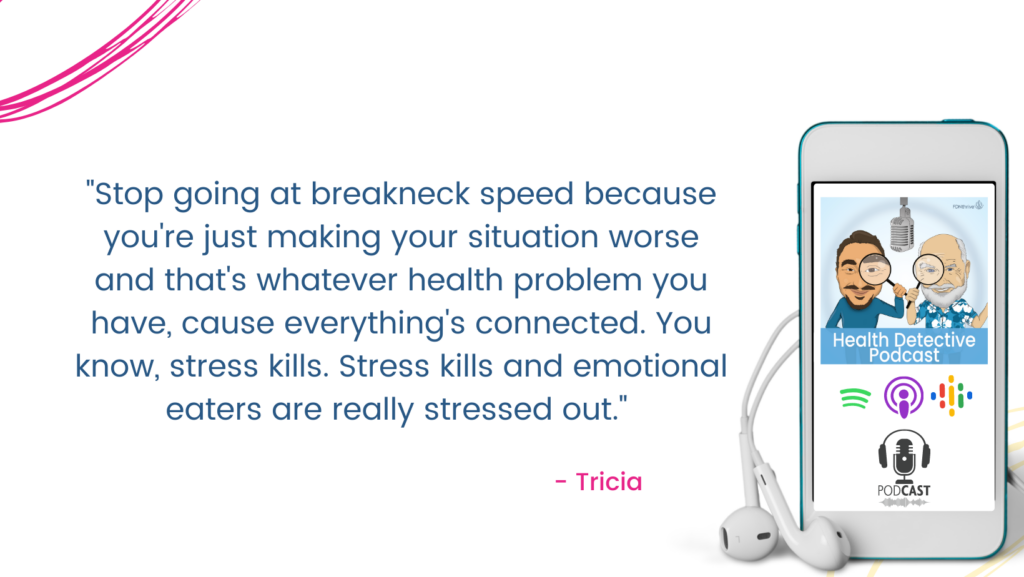
Slow the hell down. Stop going at breakneck speed because you’re just making your situation worse and that’s whatever health problem you have, cause everything’s connected. You know, stress kills. Stress kills and emotional eaters are really stressed out. We’re in a full flight from ourselves. So, you got to slow down.
But besides slowing down, having a morning routine, really taking some time to be with yourself, to connect with source – your Divine Spirit – that’s gonna make a huge difference and give you answers that you need. But again, reach out for help as well, because it’s so much easier to do this when you have support.
And if you could have figured it out on your own, you probably would have. So, there’s no shame. We have no issues getting a health coach if we’ve got some kind of health problem, or getting a trainer, if we want to get fit and train for triathlon or something. But when it comes to eating, we’re like, no, I got it. I got it. I’m good.
Yet it’s the problem we’ve had the longest. It’s the hardest to overcome because it is an addictive habit. Yet you have to eat. You probably aren’t going to figure it out on your own because you need to take a different tack. Diets will not do it.

So, my two top forms of advice are don’t diet, slow down, and reach out for help. I know that’s three.
Subjective Personal Non-negotiables
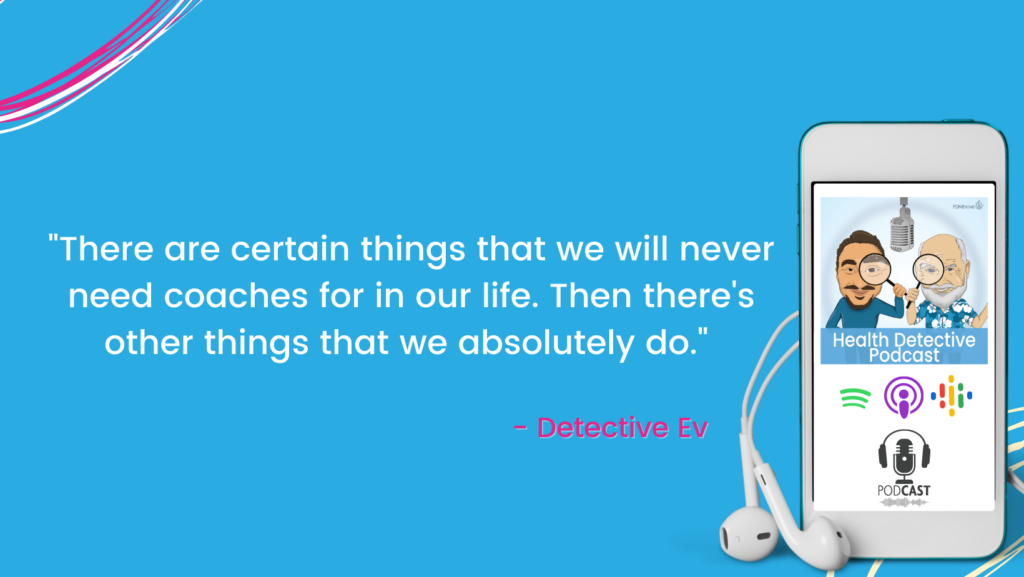
[00:42:29] Detective Ev: I generally believe that we all have these subjective personal non-negotiables. There are certain things that we will never need coaches for in our life. Then there’s other things that we absolutely do. For me, just a random health habit that I have is like, I love catching sunrise. I don’t need anyone to motivate me for that. I don’t need to wake up with someone. In fact, I always do this by myself for the most part, unless I happen to be with my girlfriend that day, then she’ll go out and do it.
But for the last several years, Evan Transue does that on his own. I don’t need someone to convince me to do that. I don’t need someone to convince me to listen to the audios and stuff that I listened to, like personal development stuff.

Almost everything else I benefit from having support or coaching with. You have to have the self-awareness enough (and this is a general life principle), know what your non-negotiables are. That like, yeah, I could be coaching on that cause I’m doing that so well. Then understand for everything else that people at the top of life, they have support for those types of things.
It’s not only okay, to me, life’s too short. I don’t know why I wouldn’t hire people and have them in my circle to help accelerate me so that I can be the best version of me while I’m here. But that’s my opinion.
Cool, Tricia. Thanks so much for being here today. Such a great conversation, man. I enjoyed talking to Tricia so much and I hope that this is something that you guys gained just as much value from as I did. I learned a lot.
A Vicious Cycle in Emotional Eating
Again, this is something in my own life recently, I’ve been recognizing more and more. And I don’t want to act like it’s the most extreme thing in the world, but I’m using food as a comforting mechanism for certain things in my life. Eating excessive amounts and yeah, maybe it doesn’t affect me weight wise, but it does affect me skin wise.
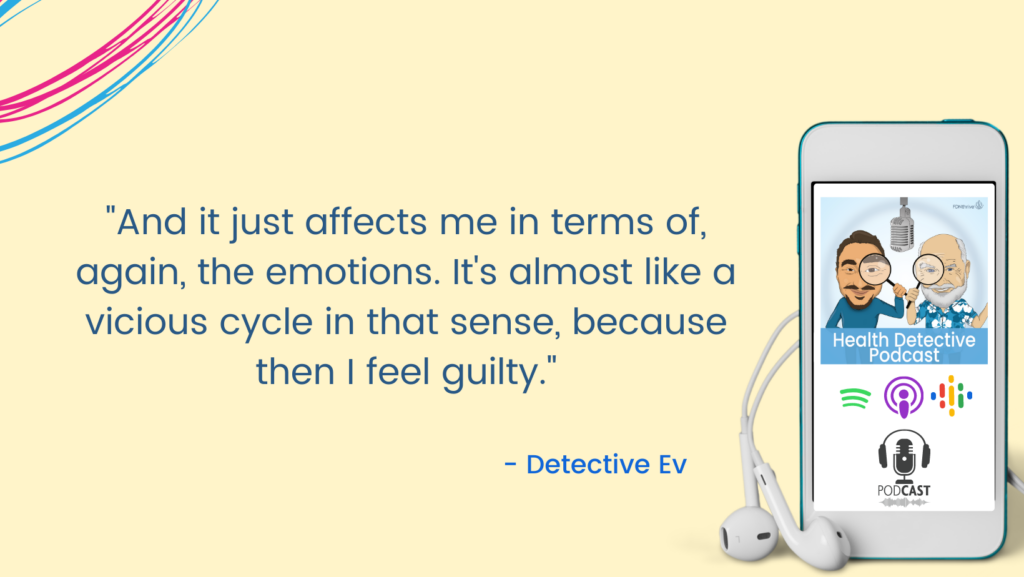
And it just affects me in terms of, again, the emotions. It’s almost like a vicious cycle in that sense, because then I feel guilty. I’m like, why did I just do that? Like I said, I was going to eat this way today and then I didn’t eat that way. It’s kind of interesting how it can come through these phases because there’s been times in my life where this just hasn’t been a problem at all.
And I know Tricia and I were talking about in the beginning how it can kind of come in waves. So, if this is something that you relate to and something that you think is important, then consider reaching out to Tricia and getting connected with her. I think this is something that’s really a positive thing to be doing in conjunction with FDNthrive.
And if you’re on that far, far end of the spectrum, perhaps it’s something that you pursue even before FDNthrive, because we will find some things for you that will require lifestyle changes. And if you’re stuck in that addictive mode, it might be hard to make those changes. Use this stuff in conjunction or do it beforehand, whatever you feel like you need to do.
Conclusion
But there’s very few people that I talk to that have just done such a large amount of the deep work that it just shines obviously. I would say that this is the case today, and this isn’t a condemnation of anyone else that comes on. So many people are pursuing the deep work. It’s just the time that she’s been doing it.

Many people don’t have 20, 30 years under their belt of doing a specific thing. I think it’s amazing. Maybe I’m being biased because I know how much it benefited me. I have no idea.
But if you guys like this just as much as me, then let us know in either the ratings on Apple Podcasts or, I always say this, you can go to Podbean and search for the Health Detective Podcast. Podbean is a podcast platform and leave us comments there. Yes, it’s a smaller podcast platform. I don’t think as many people use it, but it is the place that we host this podcast.
We’re able to interact with you there. I read all of the comments. I respond to all of them. So please let us know if this is something that helped you today, because this was a little bit of a different conversation than we normally have.
With that said, thank you guys so much for listening to yet another episode of the Health Detective Podcast by FDNthrive. As always, I’m your host, Evan Transue, AKA Detective Ev, and we’ve been listening to an interview with Tricia Nelson.
We’ll talk to you guys again soon and I’m looking forward to the next interview. Take care.
[00:46:13] Intro/Outro : Thanks for tuning into the Health Detective Podcast. If you are ready to finally work with a real health detective on your health journey so that you can get well and stay well naturally, visit us at fdnthrive.com and click the ” Get Started Here” button.

